 18/03/2009 04:41 18/03/2009 04:41 |
|
| | | OFFLINE | Post: 3.681 | Registrato il: 23/11/2005
| Utente Master | |
|
OREMUS PRO PONTEFICE NOSTRO
The Holy Father requests the prayers of all the faithful so that the Lord may illumine the road for the Church. May the commitment of Pastors and the faithful grow, in support of the delicate and weighty mission of the Successor of the Apostle Peter as 'the guardian of unity' in the Church.
- Vatican Note, Feb. 4, 2009
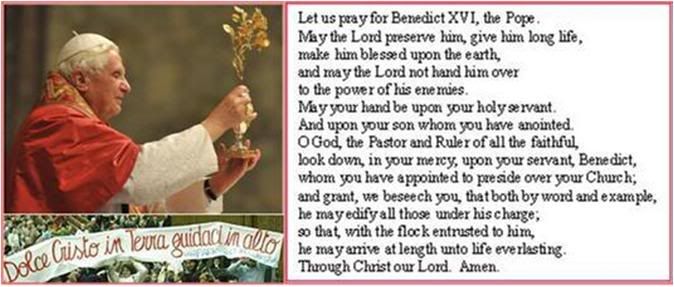
 Here's some followup stories on the pope's words about condoms and AIDs. You won't find this in the secular media.
Push Condoms, Worsen AIDS
Here's some followup stories on the pope's words about condoms and AIDs. You won't find this in the secular media.
Push Condoms, Worsen AIDS
POSTED BY TOM HOOPES
National Catholic Register
Tuesday, March 17, 2009 3:52 PM
More on the Pope’s visit to Africa as it progresses. But the New York Times and others are jumping, hard, on a first story: Pope Says Condoms Make AIDS Problem Worse.
He’s right, by logic anyone would recognize. But that’s not how the story’s being played.
The New York Times story starts by quoting Pope Benedict XVI speaking to reporters on the plane to Yaounde, Cameroon.
Pope Benedict says of the AIDS crisis: “You can’t resolve it with the distribution of condoms. On the contrary, it increases the problem.”
The Times allows for this explanation: “The pope said a responsible and moral attitude toward sex would help fight the disease.”
But it quickly marshals AIDS activist Rebecca Hodes answering back with: “His opposition to condoms conveys that religious dogma is more important to him than the lives of Africans.”
Nonsense. Rebecca Hodes’ sexual dogma is more important to her than the lives of Africans.
Think of it this way: Imagine the problem was about electrical wires instead of sex. Say the young men and women of Africa just loved to play on electrical wires, but many of them were dying of electric shock.
Activists from the UN Fund for Safe Playtime might say: “Everyone must fund our ‘wear rubber gloves’ campaign. We’re teaching young people that they must wear rubber gloves and then they can play on electrical wires all they want.”
Common sense would say: “Wait a second. Maybe they shouldn’t play with electrical wires at all. In other countries, it’s simply taboo. These countries have successfully avoided an epidemic of electrical wire deaths.”
Only in a world gone mad in its views of playing on electrical wires would serious people say: “Come on, kids will be kids. You can tell them not to play on electrical wires 1,000 times and you know what? They’re still going to play on electrical wires. Let them have their fun. Talk about the importance of rubber gloves, instead.”
In that world gone mad, the rubber glove campaign would spread throughout Africa. Orlando Bloom would appear in ads made by the UN Fund for Safe Playtime. He would appear swinging from an electrical wire and wearing a big rubber glove, saying, “I love playing on electrical wires, just like you. But I always wear my rubber gloves!”
The stigma about electrical wires would grow less and less.
And then ... More and more young people would die. Condom promoters may be the only ones who haven’t noticed that young people often forget or shrug off things like driving carefully, drinking responsibly, or avoiding other risky behaviors.
Once you promote playing on electrical lines with rubber gloves, you’re sure to have to deal with the zapped shells of kids.
And once you promote playing around with sex, you’re marching more and more young people to their doom.
The research proves it.
**********
Condoms, AIDS and Research
POSTED BY TOM HOOPES
Naitonal Catholic Register
Tuesday, March 17, 2009 4:35 PM
To continue last post: The research backs up the Pope, too.
Last year, the Register spoke with secular experts who said that, in many places, condom promotion actually increases AIDS.
We explained, in Grace Candiru’s recent story about Uganda:
Edward Green is director of the AIDS Prevention Research Project at the Harvard Center for Population and Development Studies. He wrote Rethinking AIDS Prevention: Learning From Successes in Developing Countries and reported that, between 1989 and 2001, the average number of condoms per male ages 15 to 49 in African countries skyrocketed. So did the number of those infected with HIV. South Africa, Botswana and Zimbabwe had the world’s highest levels of condom availability per man. They also had the world’s highest HIV rates.
Norman Hearst is a family physician and epidemiologist at the University of California, San Francisco.
UNAIDS, the Joint United Nations Program on HIV/AIDS, asked Hearst to do a scientific review to see if condom promotions had reversed HIV/AIDS epidemics. His review found the contrary was true. Countries with the most condoms per man tended to have the highest HIV rates. UNAIDS refused to publish Hearst’s findings.
“Condom promotion in Africa has been a disaster,” Hearst said.
Nearly every country on the continent has vigorously promoted condoms to stem the tide of the AIDS epidemic there. But the epidemic has only grown larger.
Uganda, on the other hand, has experienced the greatest decline in HIV prevalence of any country in the world, according to the Heritage Foundation. The Ugandan public education campaign against AIDS mentioned condoms, but emphasized abstinence.
Studies show that from 1991 to 2001 HIV infection rates in Uganda declined from about 15% to 5%.
“The Ugandan model has the most to teach the rest of the world,” said Green. “This policy should guide the development of programs in Africa and the Caribbean.”
Jeff Spieler, chief of the research division in the U.S. Agency for International Development population office, said, “It just happens to be where the evidence is pointing.”
*******************************************************************^
Thank you for finding these items, Benefan! I have been mentioning the Uganda experience in commebting on the Pope's remarks, but I really did not have the time to go back and look for the items - I know I posted such reports at least a couple of times in the past.
TERESA
[Modificato da TERESA BENEDETTA 19/03/2009 23:41] |
|
 18/03/2009 10:51 18/03/2009 10:51 |
|
| | | OFFLINE | | Post: 16.858 | Registrato il: 28/08/2005
| Utente Gold | |
|


March 18
 St. Cyril of Jerusalem (313-386)
St. Cyril of Jerusalem (313-386)
Bishop, Confessor, Doctor of the Church
OR today.
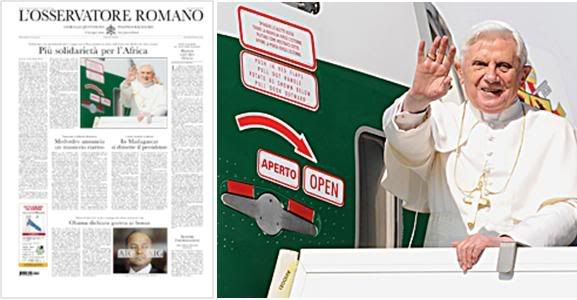
Speaking to newsmen enroute to Cameroon, the Holy Father proposes
a reading of the present global crisis in the light of Christian values:
'Greater solidarity with Africa'
The issue went to press before the Pope arrived in Cameroon yesterday and the main story is a report
on the inflight news conference, not the transcript itself. Other Page 1 stories: An editorial commentary
on strategic choices for coming out of the recession, and news stories on Russian President Medvedev
announcing massive rearming despite the financial crisis; the resignation of the President of Madagascar
as the military takes over; and President Obama's denunciation of employee bonuses totalling 265-million
dollars paid by AIG, the insurance group bailed out by the US government for a total so far of $140 billion
in federal funds.
THE POPE'S DAY
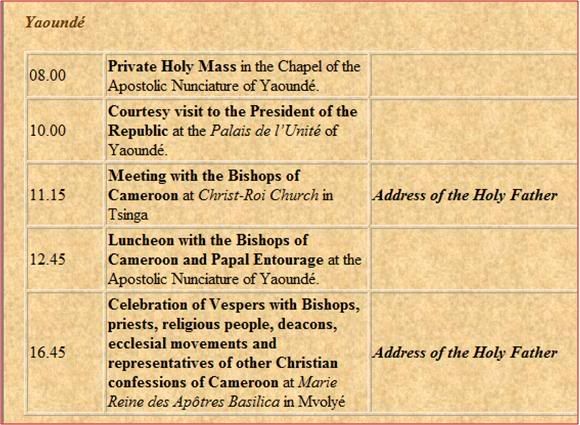
[Modificato da TERESA BENEDETTA 19/03/2009 23:43] |
 18/03/2009 10:55 18/03/2009 10:55 |
|
| | | OFFLINE | | Post: 16.859 | Registrato il: 28/08/2005
| Utente Gold | |
|
RESERVED FOR TRANSLATION OF OR ARTICLE ON THE POPE'S INFLIGHT CONFERENCE |
 18/03/2009 12:39 18/03/2009 12:39 |
|
| | | OFFLINE | | Post: 16.861 | Registrato il: 28/08/2005
| Utente Gold | |
|
 Pope visits Africa's growing flock
Pope visits Africa's growing flock
By Scott Baldauf

March 18, 2009
JOHANNESBURG, South africa – As Pope Benedict XVI makes his first trip to Africa as the head of the Roman Catholic Church, he will confront a phenomenon that can only be called a mystery.
Why is it that Africa – a continent of bloody conflicts, forced migration, rampant health problems, and profound poverty where as many as 800 million people suffer from chronic hunger – contains some of the most exuberantly religious people on earth?
How do Africans find so much hope amid the hopelessness?
Unlike Europe and much of the Western world, where church membership seems to be on a constant decline, Africa is a kind of religious Klondike, where mainstream Christian churches, evangelical churches, and Muslim faiths all appear to be growing with no end in sight.
The Catholic Church alone has 185 million members in Africa – 20 percent of the continent's population. In countries, like Angola, with a Catholic colonial past, Catholics make up 60 percent of the population.
"Africa has so little, but it has a strong spiritual sense that is often lacking in the Northern Hemisphere," says the Rev. Rodney Moss, head of the school of theology at St. Augustine College, South Africa's only Catholic university. "Those who have the least often are those who realize the deeper need for the grace of God."
It's hard to imagine a time of greater need than right now in Africa. The global economic slowdown means richer nations have less demand for the natural resources – from oil and uranium to copper and gold – that Africa has to sell. The credit crunch has also slowed aid dollars.
Add to that the continued spread of HIV/AIDS, ongoing conflict in Sudan and the Democratic Republic of Congo, and a self-destructive government in Zimbabwe, and Africa's needs might seem unfathomable.
Yet African clerics say there is a hidden strength in that misery.
"There is a certain way of evaluating the material worth of things, that it has not conveyed everything of what it means to be happy," says Father Pius Rutechura, chair of the Nairobi-based Association of Member Episcopal Conferences in Eastern Africa.
"When the pope comes to Africa, he will see a real mixture of hope, a church that is vibrant, that celebrates life, but also he will see the challenges many Africans face, and a people who have more questions than answers about their lives."
Starting on Tuesday, in the Cameroonian capital of Yaounde, Pope Benedict (known as Benoit in French-speaking Africa) will meet with the country's leaders and conduct Masses for the large Catholic population. He will also meet with leaders of Cameroon's large Muslim community.
Cameroon has avoided many of the sectarian conflicts that have cropped up repeatedly in Nigeria and Sudan, although the aggressiveness of Muslim and Christian missionaries, and the political use of religion by national leaders found in this country, both contribute to violence throughout Africa.
After Cameroon, the Pope will go to Angola – site of the first African mission, where Portuguese priests began to convert people 500 years ago. Angola's newfound oil wealth is just beginning to help the country rebuild after a 27-year civil war, which ended in 2002.
In a speech Sunday, Pope Benedict said he would avoid politics, but would discuss with political leaders the crippling effects of corruption. He also promised to appeal to donor nations not to neglect Africa.
"I entrust to the heavenly intercession of this great saint [Joseph, whose feast day is tomorrow, March 19] the upcoming pilgrimage and the populations of Africa as a whole, with the challenges that mark them and the hopes that animate them," the Pope said [in his Angelus messgae last Sunday].
"In particular, I think of the victims of hunger, of disease, of injustice, of fratricidal conflicts, and of every form of violence that continues to afflict adults and children, without sparing missionaries, priests ... and volunteers," he said.
By choosing Cameroon and Angola, the Pope has underlined the church's strength in non-English-speaking Africa. Some aid workers say the church flexes its power in French-speaking Africa almost as if it were the state itself.
"If you [mess around] with the Catholic Church, they will break you," says Christine Karumba, country director for the Democratic Republic of Congo for Women for Women International, a women's rights organization based in Washington. "If they like you, they'll fight for you."
Family planning is a big initiative for the group, and condom distribution was one of its programs, which the hurch vehemently opposes. The Church made it very hard for her to carry out other programs, because of its opposition to that issue, she says, so she had to go into overdrive diplomatically to smooth things over.
A priest from the village of Kanyola says the Congolese people would be overjoyed if the Pope came "because he's the top guy. The joy to see the father come to our home would be huge."
He said if he had a message for the Pope, it would be: "We want you to lobby for peace and unity [in Congo] so the population can live without worry."
Africans will certainly expect the Church to come to Africa's aid, says Father Rutechura, noting that already it is one of the major donors in Africa.
"People will have expectations and hope that the religion of Christianity will respond with the provision of social services that could make people better off. There is an issue of credibility here that we get value, not political short-term promises."
Matthew Clark contributed from the Democratic Republic of Congo.
Media distort Pope’s position
on condoms in Africa

March 17, 2009
Today Pope Benedict XVI began a five-day pastoral trip to Africa where the Catholic Church is growing in leaps and bounds, even while its members and charitable institutions face enormous social challenges.
Statistics of church attendance, baptisms and other sacraments, and priestly and religious vocations show faster growth for the Catholic Church in Africa than in any other part of the world.
This growth is paralleled, however, with a local reality of tribal warfare, government corruption, poverty, and disease in large swaths of the continent.
Dorothy Kwenze, an HIV activist in neighboring Kenya was recently quoted saying, “Abstinence education remains the best strategy, especially for the risk group aged 15-25 years. The concept has worked well for Uganda and can work for other African countries”.
All of this, and what’s making the news? “Pope Says ‘No’ to Condoms.”
Thanks to the Associated Press’ reporting, you will see this headline or a similar one on every major American news site, as a first report of what this trip is all about. As a report, I consider it shallow, at best.
Aboard the Alitalia plane headed to Yaounde, Cameroon, the Pope responded to a reporter’s question about the AIDS epidemic and the Church’s refusal to promote condom distribution as the solution. Pope Benedict XVI said:
“You can’t resolve it with the distribution of condoms. On the contrary, it increases the problem.”
For the record (and, unfortunately, among the major news sites you’ll only see this distinction made here on Foxnews.com), the Pope’s statement was specifically a judgment against condom distribution as a solution to the HIV epidemic.
He did not say condoms don’t work in preventing the transmission of the HIV virus. He did not say the Church would prefer that an HIV positive patient infect a sexual partner than that he or she use a condom. He did not say it’s a “double sin” to use a condom in non-marital sex.
Pope Benedict knows history is proving the mass distribution of condoms by the United Nations and population control organizations as the principle strategy against AIDS has failed miserably.
He also knows countries that have focused their efforts on integral sexual education, including the promotion of pre-marital abstinence and the beauty of marital fidelity, have seen infection rates plummet.
Uganda is the showcase for this more human approach. Uganda once had the highest infection rate in the world. In the 1990’s, thirty percent of the country’s population was infected; today the rate is down to about eight percent.
Although the Ugandan government also educated the population on condom use for protection against the virus, many HIV/AIDS experts credit the country-wide abstinence program launched in 1994, “True Love Awaits”, for Uganda’s great success in reducing infection rates. Schools and religious organizations got behind the government program and sexual habits changed.
Other African countries are watching and learning, as Dorothy Kwenze notes, in the quotation we made earler.
Let’s continue to debate how best to prevent the transmission of the HIV virus and how best to care for AIDS patients. But let’s not be duped by shallow reporting that pits one helping hand against the other and only complicates the work at hand.
[Modificato da TERESA BENEDETTA 19/03/2009 23:45] |
 18/03/2009 13:02 18/03/2009 13:02 |
|
| | | OFFLINE | | Post: 16.862 | Registrato il: 28/08/2005
| Utente Gold | |
|
 This could be Benedict XVI's next big surprise for the world!
Hopes raised for
This could be Benedict XVI's next big surprise for the world!
Hopes raised for
John Paul II's beatification
in April 2010
by Richard Owen in Rome

March 17, 2009
The Vatican today refused to either "confirm or deny" reports in the Polish media that the late Pope John Paul II would be beatified five years after his death, in April next year - the penultimate step toward sainthood.
Commenting on a report in the Polish daily Dziennik Father Tadeusz Pieronek, the "postulator" for John Paul's beatification cause in the diocese of Krakow, said it was "wonderful news".
Earlier this month Cardinal Stanislaw Dziwisz, the archbishop of Krakow, who was John Paul's long serving secretary, said the beatification process would be concluded "within a few months".
However reports said the Congregation for the Causes of Saints had speeded up the process at the wish of Pope Benedict XVI, who waived the normal lengthy procedures after his predecessor's death and allowed the beatification to go ahead on a fast track.
At John Paul's funeral in April 2005 many of the faithful held up placards calling for him to be made a "Santo Subito" - a saint immediately.
[Modificato da TERESA BENEDETTA 28/03/2009 22:59] |
 18/03/2009 13:25 18/03/2009 13:25 |
|
| | | OFFLINE | | Post: 16.863 | Registrato il: 28/08/2005
| Utente Gold | |
|
 So much for the deluded rabbi's headline-baiting. And thank God!
Israeli ambassador confirms
So much for the deluded rabbi's headline-baiting. And thank God!
Israeli ambassador confirms
Pope Benedict may wear the Cross
at the Western Wall

Rome, Italy, Mar 18, 2009 (CNA).- Contrary to comments attributed to an Israeli rabbi, Pope Benedict XVI will not be barred from entering the holy area of Jerusalem’s Western Wall while wearing a cross.
On Tuesday the Jerusalem Post quoted Rabbi Shmuel Rabinovitch, who oversees worship matters at the Western Wall, as saying that the Pope should not wear a cross during his visit to the area.
“It is not fitting to enter the Western Wall area with religious symbols, including a cross,” the rabbi reportedly said, according to SIR. [In the preceding page of this thread, I posted the Jerusalem Post article.]
Mordechay Lewy, Israel’s Ambassador to the Holy See, issued a clarifying statement saying that the Jerusalem Post’s quotation was “misleading.”
Ambassador Lewy said that Israel will “respect, as a matter of course, the religious symbols of the Holy Father and of his entourage, as expected in accordance with rules of hospitality and dignity,” following the same procedure applied in Pope John Paul II’s papal visit to Israel in 2000.
“This was confirmed to a high Official of the Ministry of Foreign Affairs of Jerusalem personally by Rabbi Shmuel Rabinovitch,” the ambassador’s statement continued.
Pope Benedict is scheduled to visit the Western Wall on May 12 as part of his journey to the Holy Land.
[Modificato da TERESA BENEDETTA 18/03/2009 14:00] |
 18/03/2009 13:58 18/03/2009 13:58 |
|
| | | OFFLINE | | Post: 16.865 | Registrato il: 28/08/2005
| Utente Gold | |
|
 DAY 2
DAY 2
THE POPE'S COURTESY VISIT
WITH PRESIDENT BIYA
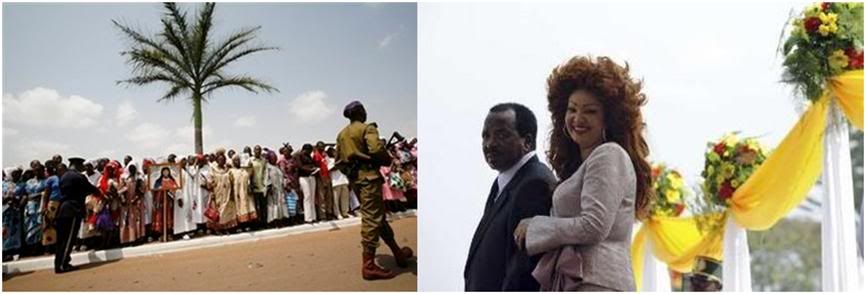
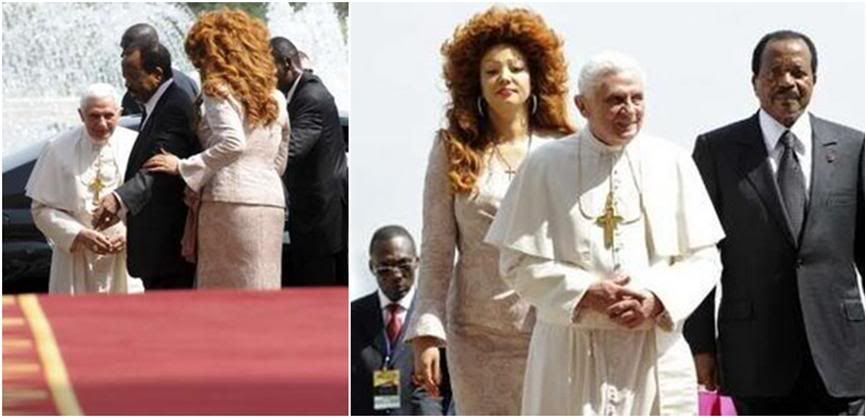
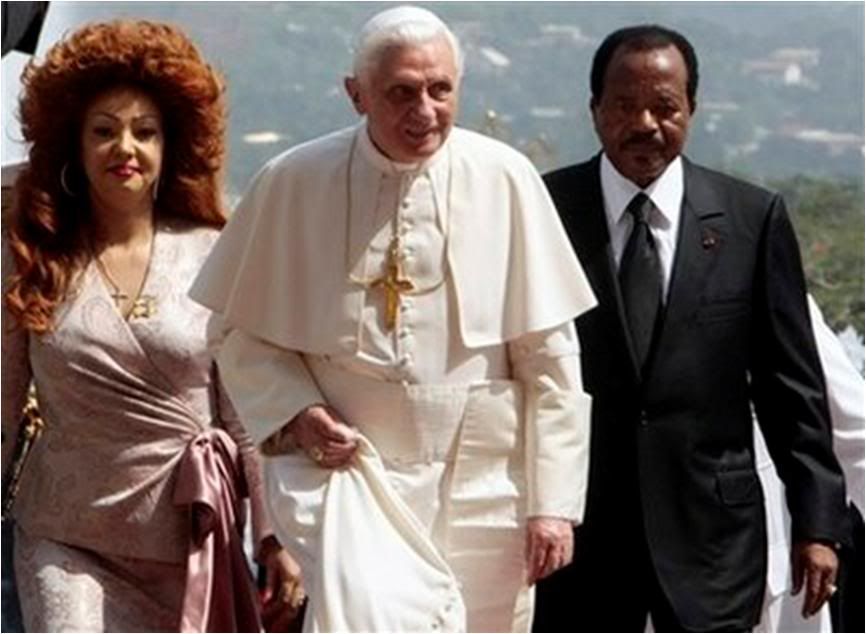
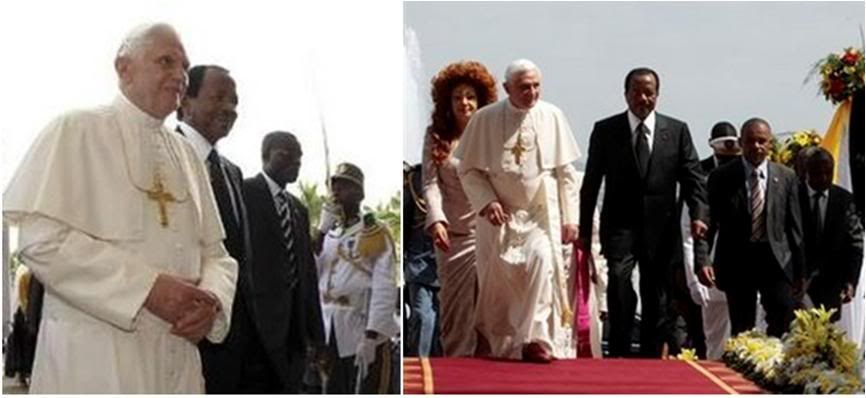
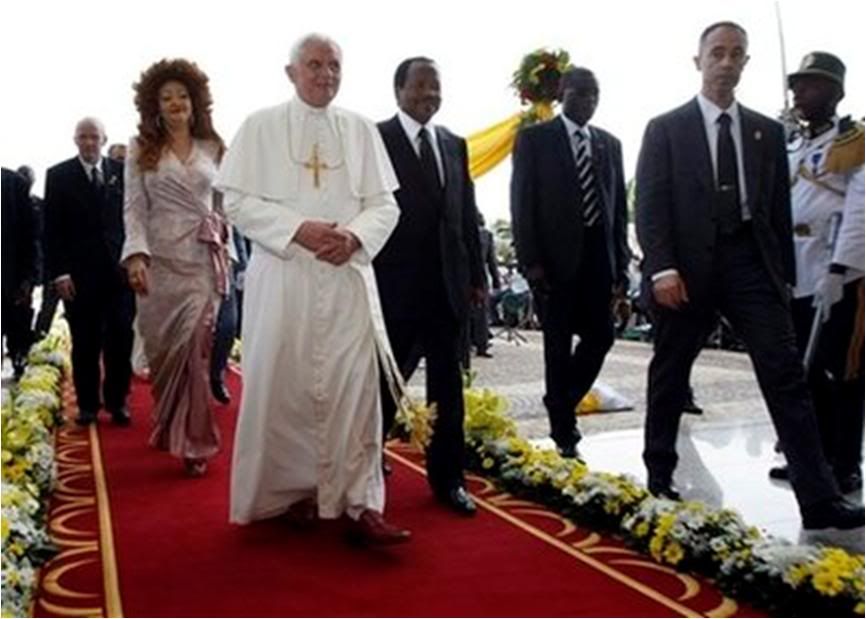
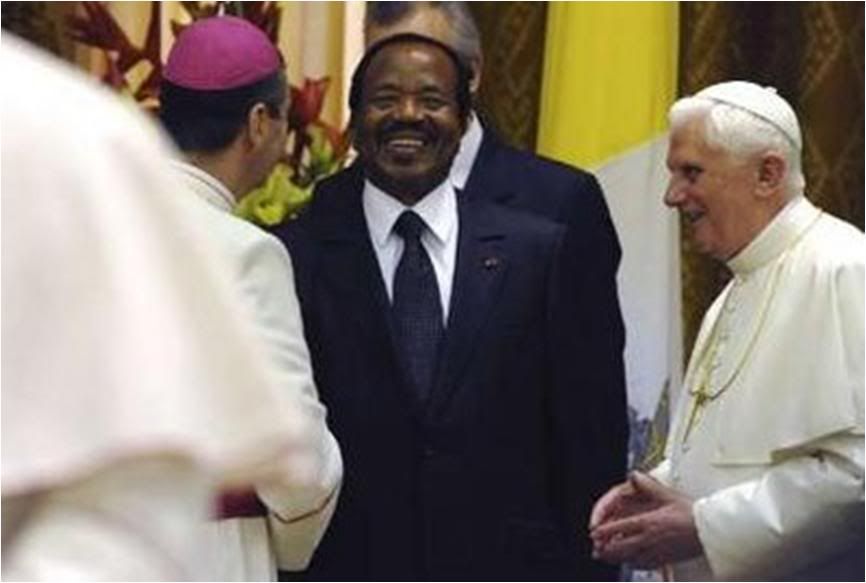
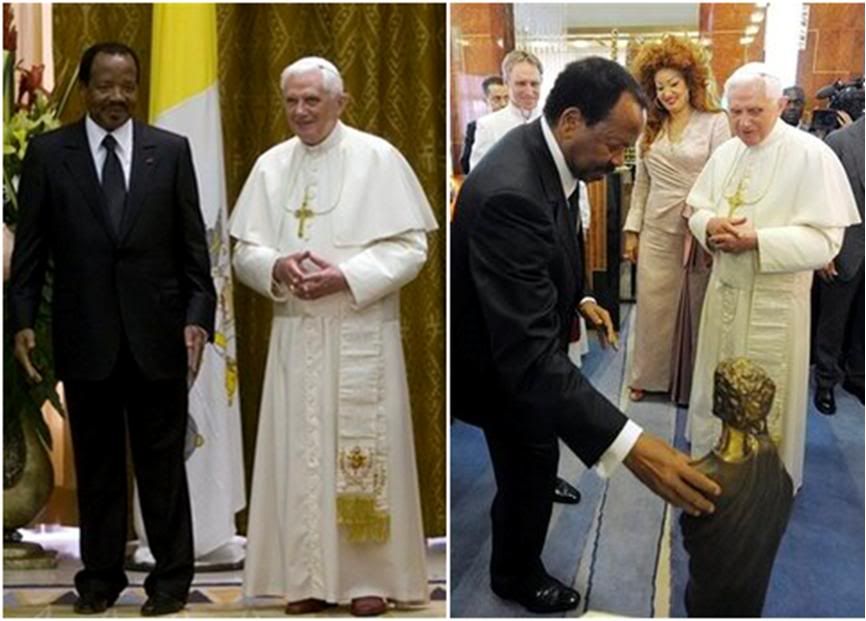
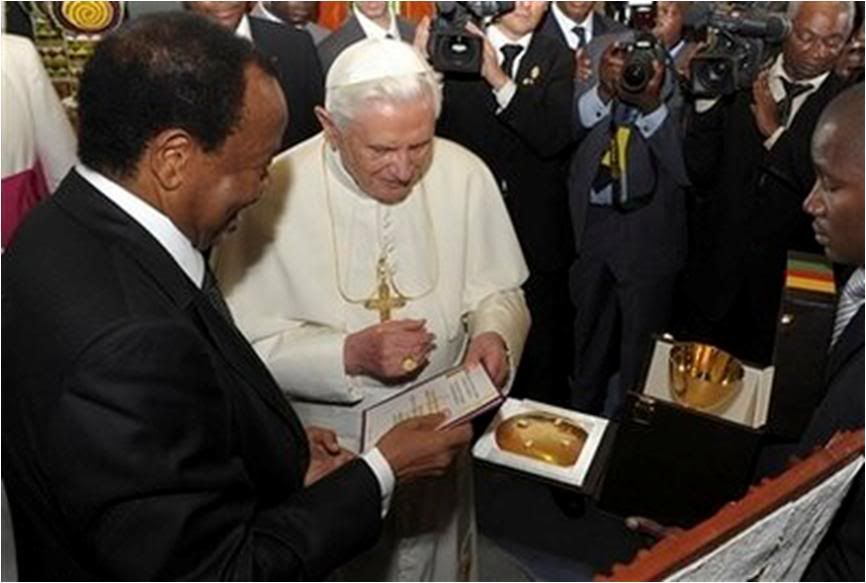 Background data
Background data
from the dossier of

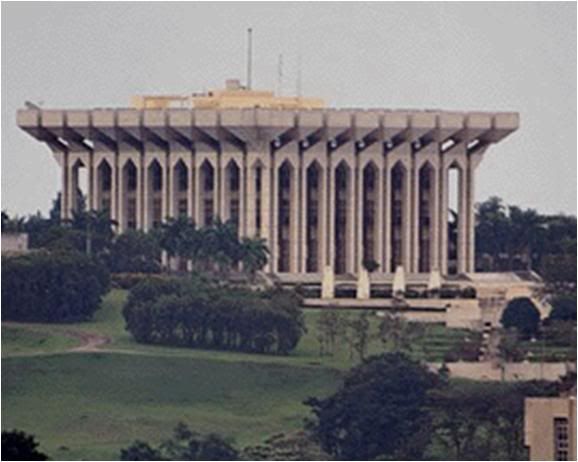
The Presidential Palace of Cameroon, known as the Palais d’Unite, and also Palais d’Etoudi (after its location), houses the offices of President Paul Biya, head of state since 1982.
This is the third time that President Biya has welcomed a Pope to his country, after the two previous visits of John Paul II: 12 August 1985 at the same Presidential Palace and 14 September 1995 at Yaoundé airport.
The Palace was inaugurated in 1980 by the then President Ahmadou Ahidjo. Because it is a precious work of architecture and because of security, the palace is not open to the public. The building stands on the lands of the Etoudi tribe, and this is why it is known as the Palais d’Etoudi.
It was built by French-Tunisian architect Olivier Clément Cacoub, WHO produced many works in Paris, Nice Grenoble, Russia, Tahiti, etc.
He was the architect of the presidential palace in Gbadolite (Democratic Republic of Congo), birthplace of Gbadolite Mobutu Sese Seko; of the presidential palace in Yamoussoukro (Ivory
Coast) and the French Cultural Centre in Brazzaville (Republic of Congo). Olivier Clément Cacoub was also the architect of the Résidence du Golf, the private residence of President Biya.
President Paul Biya
Born on 13 February 1933, in the south of the country (Mvomeka'a) , in French Cameroon, the President entered politics under the presidency of Ahmadou Ahidjo and became Prime Minister in 1975. Ahidjo resigned on 6 November 1982.
Biya assumed the presidency of the Republic entering into conflict with the former president who was forced into exile in 1983 and died in 1989.
Biya is a Catholic and a member of the Beti-Pahuin ethnic group. He studied in Paris at the Institut d'Etudes Politiques de Paris obtaining a degree in 1961 in international relations.
In 1984 he obtained a Masters in Business and Public Administration at Eastern University [?] in Washington. Besides being assistant to President Ahidjo he was also finance minister.
He is a member of the RDPC (popular democratic union of Cameroon) and after 1982 he was re-elected in 1997 and 2004, officially with 70.92% of the votes, but serious irregularities were denounced by the Opposition.
[Modificato da TERESA BENEDETTA 19/03/2009 23:46] |
 18/03/2009 14:01 18/03/2009 14:01 |
|
| | | OFFLINE | | Post: 16.866 | Registrato il: 28/08/2005
| Utente Gold | |
|
 For some reason, the Pope's meeting with the bishops of Cameroon was not telecast today - and I kept both EWTN and KTO throughout the morning. Lella says on her blog it was not telecast in Italy either. But here is the English translation of the text from Vatican Radio.
DAY 2
For some reason, the Pope's meeting with the bishops of Cameroon was not telecast today - and I kept both EWTN and KTO throughout the morning. Lella says on her blog it was not telecast in Italy either. But here is the English translation of the text from Vatican Radio.
DAY 2
MEETING WITH THE BISHOPS OF CAMEROON
The Holy Father met at noon today with the Bishops of Cameroon at the Christ-Roi (Christ the King) Church in the Tsinga district of Yaounde.
NB: Note that everyone is in tropical white today, even the members of the Pope's entourage
(Cardinals Bertone and Arinze, and Mons. Marini, on the right side of the group pictures).
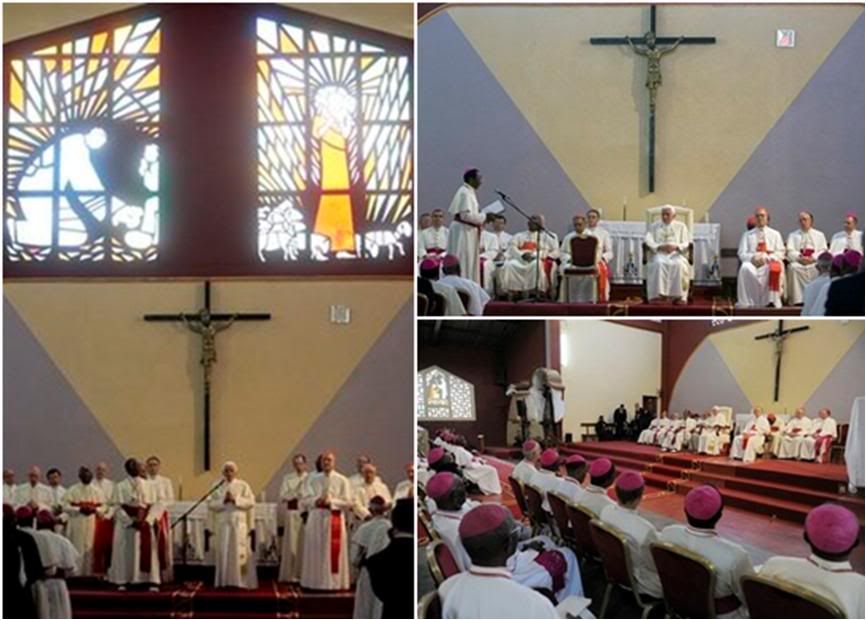
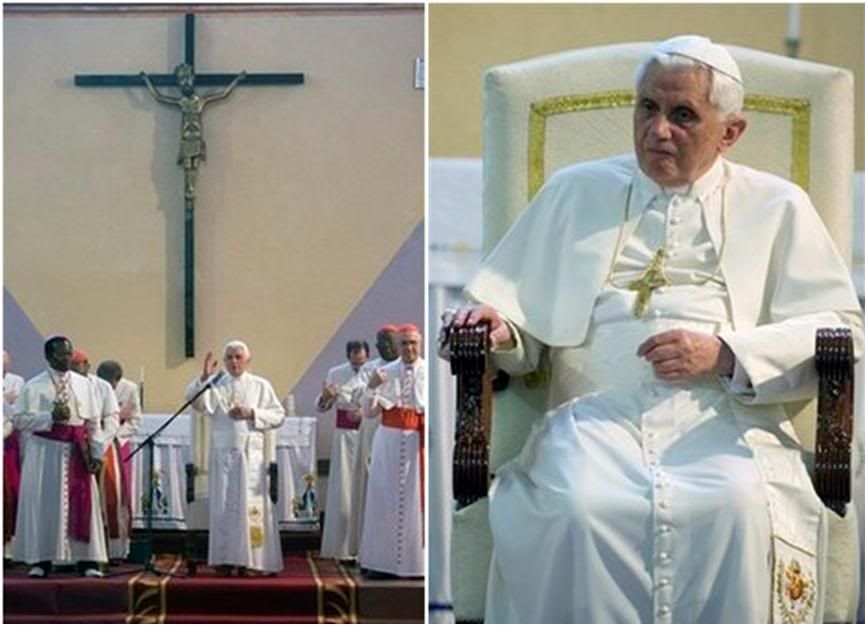
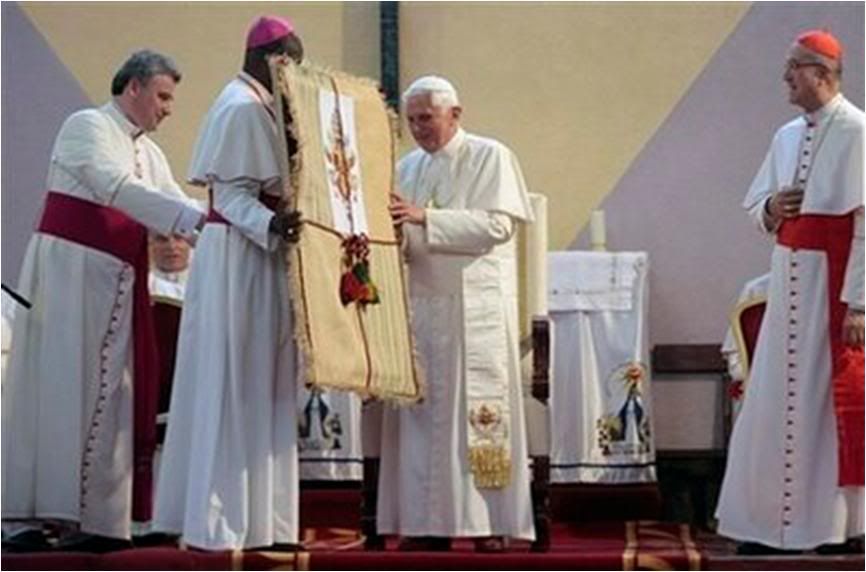
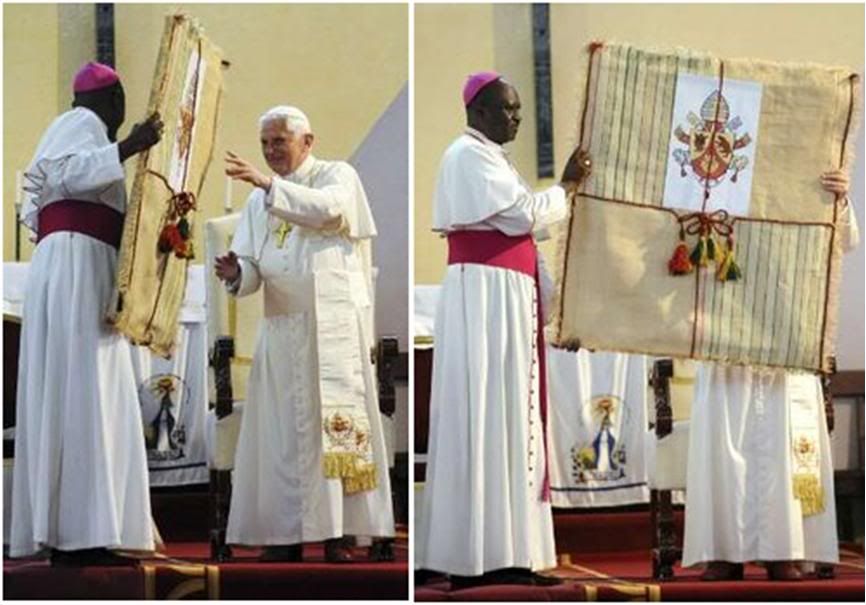 Here is the Vatican translation of the Pope's address which was delivered in French and English:
Here is the Vatican translation of the Pope's address which was delivered in French and English:
THE HOLY FATHER'S ADDRESS TO THE BISHOPS
He began in French:
Dear Brother Bishops,
This meeting with the Pastors of the Catholic Church in Cameroon gives me great joy.
I thank the President of your Episcopal Conference, Archbishop Simon-Victor Tonyé Bakot, Archbishop of Yaoundé, for the kind words he has addressed to me in your name.
It is the third time that your country has welcomed the Successor of Peter. As you know, my reason for coming is in the first instance to meet the peoples of the beloved African continent and also to present to the Presidents of the Episcopal Conferences the Instrumentum laboris of the Second Special Assembly for Africa of the Synod of Bishops.
This morning, through you, I would likeo offer affectionate greetings to all the faithful entrusted to your pastoral care. May the grace and peace of the Lord Jesus be with each one of you, with all the families of your great and beautiful country, with the priests, the men and women religious, the catechists, and all who are engaged with you in proclaiming the Gospel!
In this year dedicated to Saint Paul, it is most opportune to recall the urgent need to proclaim the Gospel to everyone. This mandate, which the Church received from Christ, remains a priority, for there are countless people still waiting to hear the message of hope and love that will enable them to “obtain the glorious liberty of the children of God” (Rom 8:21).
Together with you, dear Brothers, it is your entire diocesan communities that are sent out to be witnesses of the Gospel. The Second Vatican Council emphasized that “missionary activity flows immediately from the very nature of the Church” (Ad Gentes, 6).
In order to guide and inspire the People of God in this task, the Pastors themselves, first and foremost, must be preachers of the faith, leading new disciples to Christ. The proclamation of the Gospel is the particular task of the Bishop, who can say, with Saint Paul: “If I preach the Gospel, that gives me no ground for boasting. For necessity is laid upon me. Woe to me if I do not preach the Gospel!” (1 Cor 9:16).
To strengthen and purify their faith, the faithful need to hear the words of their Bishop, the catechist par excellence.
In order to undertake this mission of evangelization and respond to the many challenges of today’s world, besides holding formal Meetings, which are necessary in themselves, the Pastors of the Church must be united by a profound communion with one another.
The quality of the work accomplished by your Episcopal Conference, reflecting well the life of the Church and of Cameroonian society, enables you to search collectively for answers to the many challenges
which the Church has to face and, through your pastoral letters, to give common guidelines to assist the faithful in their ecclesial and social life.
A lively awareness of the collegial dimension of your ministry should impel you to bring about among yourselves a variety of expressions of sacramental fraternity, ranging from mutual acceptance and esteem to the various manifestations of charity and practical cooperation (cf. Pastores Gregis, 59).
Effective collaboration between dioceses, particularly with regard to better distribution of priests in your country, cannot fail to promote relations of fraternal solidarity with the poorer dioceses, so that the proclamation of the Gospel should not suffer through lack of ministers.
This apostolic solidarity should also extend generously to meet the needs of other local Bishops, especially those of your continent. Thus it will appear clearly that your Christian communities, following the example of those that brought the Gospel message to you, are likewise a missionary Church.
He continued in English:
Dear Brothers, the Bishop and his priests are called to maintain relations of close communion, founded on the one priesthood of Christ in which they share, albeit in different degrees. The quality of the bond uniting you with the priests, your principal and irreplaceable co-workers, is of the greatest importance.
If they see in their Bishop a father and a brother who loves them, listens to them and offers them comfort in their trials, who devotes particular attention to their human and material needs, they are encouraged to carry out their ministry whole-heartedly, worthily and fruitfully.
The words and example of their Bishop have a key role in inspiring them to give their spiritual and sacramental life a central place in their ministry, spurring them on to discover and to live ever more deeply the particular role of the shepherd as, first and foremost, a man of prayer.
The spiritual and sacramental life is an extraordinary treasure, given to us for ourselves and for the good of the people entrusted to us. I urge you, then, to be especially vigilant regarding the faithfulness of priests and consecrated persons to the commitments made at their ordination or entry into religious life, so that they persevere in their vocation, for the greater holiness of the Church and the glory of God.
The authenticity of their witness requires that there be no dichotomy between what they teach and the way they live each day. In your dioceses, many young men are presenting themselves as candidates for the priesthood. We can only thank the Lord for this.
It is essential that serious discernment should take place. With this in mind, I encourage you, despite the organizational difficulties that can sometimes occur at the pastoral level, to give priority to the choice and training of formators and spiritual directors.
They must have a personal and profound knowledge of the candidates for the priesthood, and must be capable of offering them a solid human, spiritual and pastoral formation so as to make them mature and balanced men, well prepared for priestly life. Your constant fraternal support will help the formators to accomplish their task in the love of the Church and her mission.
From the earliest days of the Christian faith in Cameroon, men and women religious have made an essential contribution to the life of the Church. I join you in giving thanks to God for this, and I rejoice at the development of consecrated life among the sons and daughters of your country, giving rise also to the expression of distinctively African charisms in communities that originated in your country.
In fact, the profession of the evangelical counsels acts as “a sign that can and should effectively inspire all the members of the Church to fulfil indefatigably the duties of their Christian vocation” (Lumen Gentium, 44).
In your ministry of proclaiming the Gospel, you are also assisted by other pastoral workers, particularly catechists. In the evangelization of your country, they have played and they continue to play a key role. I thank them for their generosity and their faithfulness in the service of the Church.
Through their work, an authentic inculturation of the faith is taking place. Their human, spiritual and doctrinal formation is therefore indispensable. The material, moral and spiritual support that they receive from their pastors, so that they can accomplish their mission in good living and working conditions, also serves to express to them the Church’s recognition of the importance of their commitment to proclaim the faith and foster its growth.
Among the many challenges facing you in your responsibility as Pastors, the situation of the family is of particular concern. The difficulties arising from the impact of modernity and secularization on traditional society inspire you to defend vigorously the essential values of the African family, and to give high priority to its thorough evangelization.
In developing the pastoral care of the family, you are eager to promote a better understanding of the nature, dignity and role of marriage, which presupposes an indissoluble and stable union.
The liturgy occupies an important place in the expression of your communities’ faith. In general, these ecclesial celebrations are festive and joyful, manifesting the fervour of the faithful who are happy to be together, in Church, giving praise to the Lord.
It is therefore essential that the joy expressed in this way does not obstruct, but rather facilitates dialogue and communion with God, attained through a genuine internalization of the structures and words of the liturgy, so that these express what is taking place in the hearts of believers, in true union with all the other participants. The dignity of the celebrations, especially when they take place in the presence of large crowds, is an eloquent sign of this.
The spread of sects and esoteric movements, and the growing influence of superstitious forms of religion, as well as relativism, constitute an urgent invitation to give new impetus to the formation of children and young adults, especially in university settings and intellectual circles.
In this regard, I would like to encourage and pay tribute to the work of the Institut Catholique of Yaoundé and all the Church institutions which have as their mission to make the word of God and the teaching of the Church accessible and comprehensible to all.
He concluded in French:
I am glad to know that the lay faithful in your country are becoming increasingly active in the life of the Church and of society. The numerous lay associations flourishing in your dioceses are a sign of the Spirit’s work at the heart of the people of God, and they contribute to a renewed proclamation of the Gospel.
I am pleased to highlight and to encourage the active involvement of women’s associations in several areas of the Church’s mission, which shows a genuine recognition of the dignity of women and their particular vocation in the ecclesial community and in society.
I give thanks to God for the eagerness of the lay people in your country to contribute to the future of the Church and to the proclamation of the Gospel.
Through the sacraments of Christian initiation and the gifts of the Holy Spirit, they are empowered to proclaim the Gospel and to serve others, both individuals and society at large.
I therefore strongly encourage you to continue to offer them a solid Christian formation so that they can “fully exercise their role of inspiring the temporal order – political, cultural, economic and social – with Christian principles, which is the specific task of the laity’s vocation” (Ecclesia in Africa, 75).
In the context of globalization with which we are all familiar, the Church takes a particular interest in those who are most deprived. The Bishop’s mission leads him to be the defender of the rights of the poor, to call forth and encourage the exercise of charity, which is a manifestation of the Lord’s love for the “little ones”.
In this way, the faithful are led to grasp the fact that the Church is truly God’s family, gathered in brotherly love; this leaves no room for ethnocentrism or factionalism, and it contributes towards reconciliation and cooperation among ethnic groups for the good of all.
Moreover, through her social doctrine, the Church seeks to awaken hope in the hearts of those left by the wayside. So it is the duty of Christians, particularly lay people with social, economic and political responsibilities, to be guided by the Church’s social teaching, in order to contribute to the building up of a more just world where everyone can live with dignity.
Dear Cardinal, dear Brother Bishops, at the conclusion of our meeting, I would like to say once more what a joy it is to be here in your country and to meet the eople of Cameroon. I thank you for your warm welcome, a sign of the generosity of African hospitality.
May the Virgin Mary, Our Lady of Africa, watch over all your diocesan communities. I entrust to her the entire people of Cameroon, and with all my heart I impart to you an affectionate Apostolic Blessing, which I also extend to the priests, men and women religious, to the catechists and to all the faithful of your dioceses.
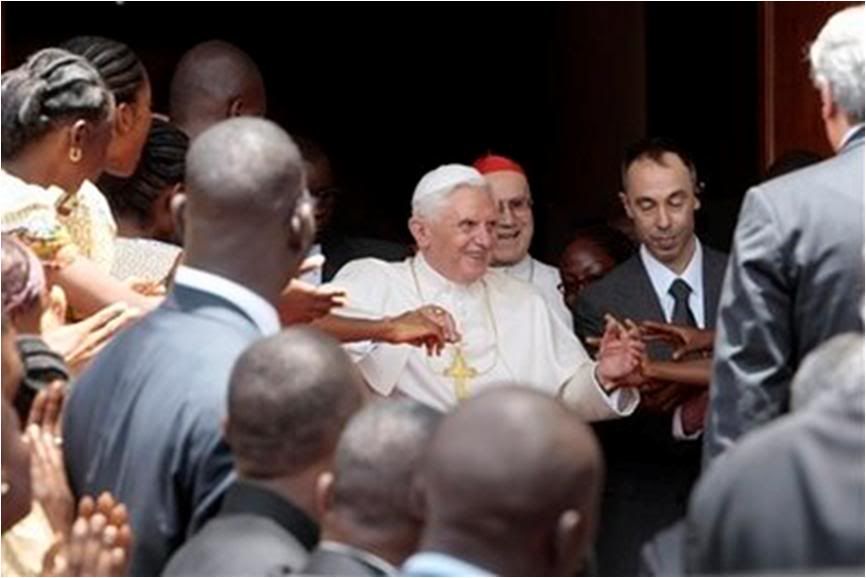
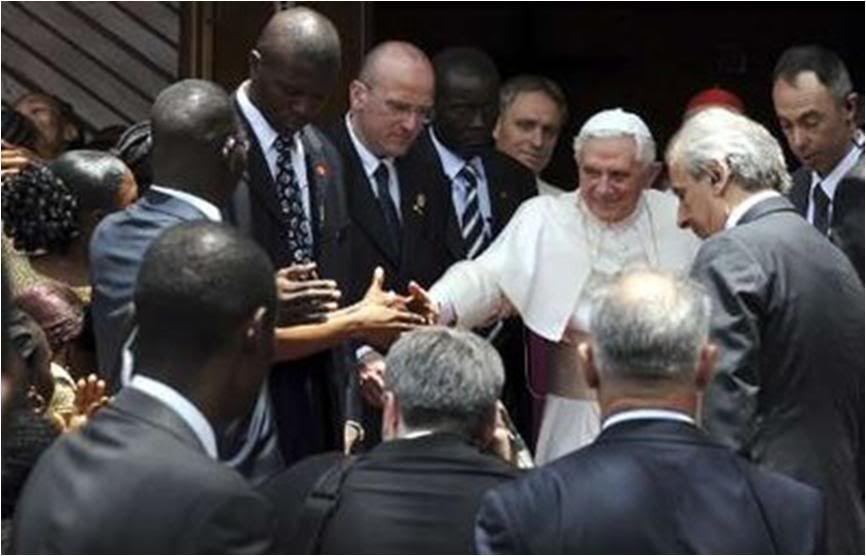 CATHOLICISM IN CAMEROON
CATHOLICISM IN CAMEROON
Cameroon's 4,842,000 Catholics, are distributed in 24 ecclesiastic
circumscriptions.
As of 31 December 2008 Cameroon had:
- 31 bishops
- 816 parishes and
- 3,630 other pastoral centres
- 1,847 priests (1,226 diocesan and 621 religious)
- 2,190 professed women religious
- 14 permanent deacons
- 288 Brothers
- 28 lay members of secular institutes
- 57 lay missionaries
- 18,722 catechists.
Other information.
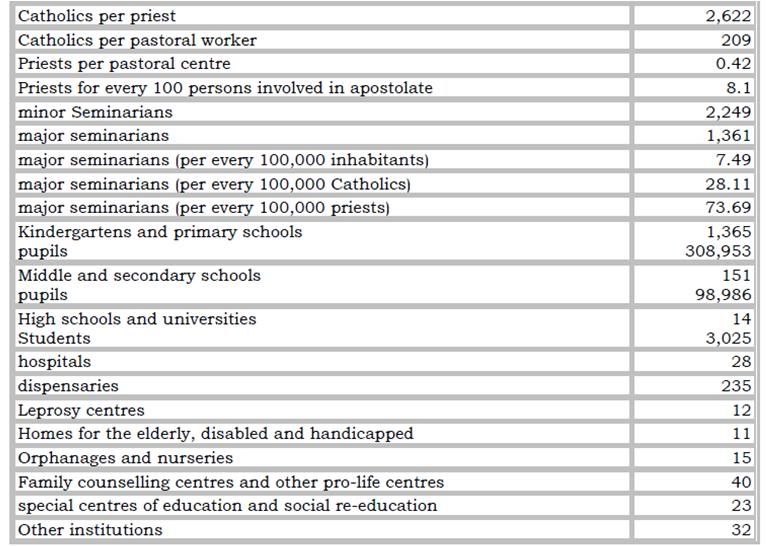
[Modificato da TERESA BENEDETTA 18/03/2009 19:51] |
 18/03/2009 16:18 18/03/2009 16:18 |
|
| | | OFFLINE | Post: 3.683 | Registrato il: 23/11/2005
| Utente Master | |
|
Here is John Allen's report that didn't pop up till this morning.
Pope addresses corruption, conflict in Africa
John Allen,
National Catholic Reporter
Yaoundè, Cameroon
March 17, 2009
Though Benedict XVI’s brief comments about condoms in response to a reporter’s question seem likely to dominate international headlines on day one of his maiden voyage to Africa, here in Cameroon, a country once rated by Transparency International as the most corrupt on earth, it was another tough papal line that actually raised more eyebrows.
In effect, the pope called on Christians to challenge the endemic corruption that many observers see as a central obstacle to development in African societies.
“In the face of suffering or violence, poverty or hunger, corruption or abuse of power, a Christian can never remain silent,” the pope said during a welcoming ceremony at the airport in Yaoundè, the national capital.
Benedict is making his first trip to Africa March 17-23, visiting Cameroon and Angola.
President Paul Biya, who has ruled Cameroon since 1982 through a combination of what observers describe as intimidation and corruption, stood at Benedict’s side as he spoke. Albeit brief and indirect, the papal language was widely taken as a mild rebuke to Biya, a former Catholic seminarian who frequently trumpets his ties to the Catholic church.
Many Cameroonians say the Catholic church here has at times played a lonely role in demanding greater transparency and democratization, pointing to a string of unsolved murders of priests, nuns and even an archbishop as the price that such outspokenness can sometimes exact.
Benedict also used blunt terms to describe the wider difficulties of Africa.
“Regional conflicts leave thousands homeless or destitute, orphaned or widowed,” the pope said. “In a continent which, in times past, saw so many of its people cruelly uprooted and traded overseas to work as slaves, today human trafficking, especially of defenseless women and children, has become a new form of slavery.
“At a time of global food shortages, financial turmoil, and disturbing patterns of climate change, Africa suffers disproportionately,” Benedict said. “More and more of her people are falling prey to hunger, poverty, and disease.”
To be sure, the pope praised Cameroon for its peacefulness, its record of inter-ethnic and inter-religious harmony, and its strong defense of unborn life. (Abortion is illegal here.) Nonetheless, his challenge on corruption can hardly have been what Biya was hoping for; massive billboards plastered throughout Yaoundè trumpet a “perfect communion” between the two figures, a narrative that the pope’s debut does not quite support.
The pope’s impromptu comments on condoms, meanwhile, came in response to a reporter’s question aboard the papal plane. Asked about contraception as part of anti-AIDS efforts, Benedict XVI said, “You can’t resolve it with the distribution of condoms. On the contrary, it increases the problem.”
That position is consistent with long-standing Vatican policy, as well as the line taken by most African bishops, who generally argue for abstinence campaigns rather than condoms as the best way to combat AIDS.
Roughly 22 million people in sub-Saharan Africa are infected with HIV, according to the United Nations. In 2007, three-quarters of all AIDS deaths worldwide were in Africa, as well as two-thirds of all people living with HIV.
When these condom debates arise, Vatican officials typically point out that whatever one makes of the church’s position on birth control, it is nonetheless in the front lines of anti-AIDS efforts. An estimated 25 percent of AIDS sufferers worldwide are cared for by Catholic facilities, a share which rises well above 50 percent in many African nations where the Catholic church is the largest private provider of health care.
Shortly after his election to the papacy, Benedict XVI authorized the Pontifical Council for the Pastoral Care of Health Care Workers to study the limited question of whether married couples where one spouse is HIV-positive and the other is not could employ condoms as a means of blocking transmission of the disease. Officially that remains an open question, and Vatican sources today said Benedict’s comments on the plane were not intended to settle the issue.
High expectations
Popes don’t come to Africa very often, so it’s perhaps inevitable that when they do, expectations soar well beyond the real-world possibilities of what a pontiff can actually accomplish.
Casual conversation around Yaoundè, the national capital, in the run-up to Benedict XVI’s arrival this afternoon makes the point.
“We are impatiently awaiting our pope,” said Anie Ndomo La Rose, a local trader – who, by the way, is actually Protestant. “He will chase away the evil things happening in our country.”
Loubou Charles, among the vast swath of Cameroonian youth looking for work (the official unemployment rate is 30 percent), was more explicit, saying he hopes the pope can turn the tide on corruption.
“If the coming of the pope can cause all those who have stolen state money to bring the money back to the country, it is going to be wonderful,” he said. “Let the mind of the thieves be changed so that they will cease from this act.”
L’anecdote, an independently local weekly, published a front-page special edition this morning with a list of other “burning issues” awaiting Benedict in Cameroon, including:
Clerical scandals, such as a handful of local cases of priests who have lived in what amount to common-law marriages and fathered children;
Relations with other Christian denominations and with Muslims. (Some leaders in both groups have voiced complaints that they were excluded from official planning for the papal visit, arguing that Benedict is coming not just as the head of the Catholic church but also as a head of state);
Three newly created dioceses in Cameroon that are still waiting for bishops;
The status of Africans in the Vatican (some unnamed African clergy in Rome complained to the newspaper that Africans are under-represented at senior levels, reflecting what they see as latent racism);
The crisis of governance in Cameroon, referring to a perceived lack of transparency and democratic checks and balances. (The whiff of corruption has even touched the papal visit, as the government has yet to officially publish a budget for the event.)
Competition for the Catholic church from other religious movements, including Pentcostals, Evangelicals, traditional religions, and even quasi-religious movements such as the Masons. (The robust spiritual climate of Africa was reflected in one local paper which published a rumor that the late John Paul II, during his last visit to Cameroon in 1995, performed an exorcism upon the presidential palace to cast out the ghost of the former president Ahmadou Ahidjo.)
Bringing clarity to a still-unsolved series of murders of Catholic clergy and nuns in Cameroon, stretching back to the mid-1980s.
In reality, it’s unlikely that Benedict’s three days in Cameroon can trigger a revolution on any of these fronts, at least in the short term.
The expectations themselves nonetheless indicate the excitement surrounding Benedict’s maiden African voyage. That ferment was clearly visible in the streets today in Yaoundè, as large and enthusiastic crowds gathered to welcome the pope.
Tomorrow, Benedict XVI will visit Biya in his resplendent “Palace of Unity,” nestled on a hill overlooking Yaoundè not far from the U.S. embassy. Later the pope will meet with the country’s bishops, and then lead a vespers service for priests, religious, and members of other Christian communities.
On Thursday, Benedict will meet with local Muslim leaders, and will also present the working paper for the African synod. On Friday, he moves on to Angola for the second leg of the Africa trip.
|
 18/03/2009 18:35 18/03/2009 18:35 |
|
| | | OFFLINE | | Post: 16.868 | Registrato il: 28/08/2005
| Utente Gold | |
|
 DAY 2 - ECUMENICAL VESPERS
DAY 2 - ECUMENICAL VESPERS
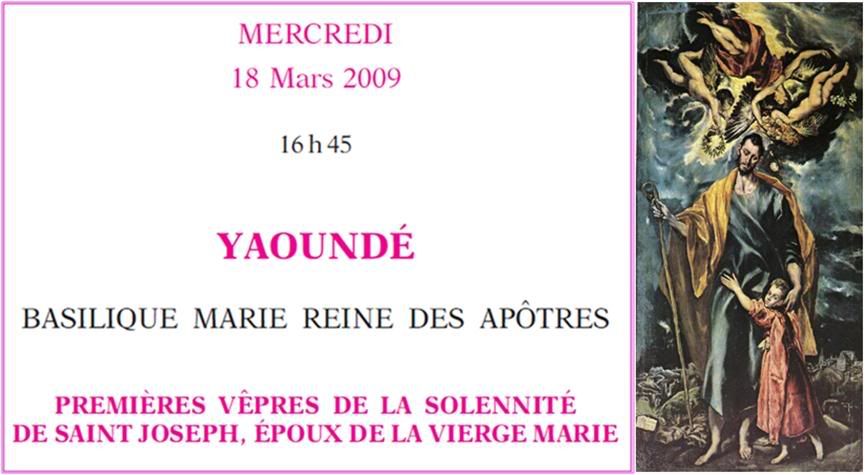 Illustration: St. Joseph and the Child jesus, El Greco, 1597-1599. Oil on canvas, 147x289 cm. Capilla de San Jose, Toledo.
Illustration: St. Joseph and the Child jesus, El Greco, 1597-1599. Oil on canvas, 147x289 cm. Capilla de San Jose, Toledo.
After his meeting with the Bishops of Cameroon today, the Holy Father had lunch with them and with the members of his delegation at the Apostolic Nunciature.
In thw early evening, he went to the Minor Basilica of Marie Reine des Apotres (Mary Queen of Apostles) in the Tsinga district of Yaounde to preside at Vespers with the bishops, priests, seminarians, religious, members of church movements and associations, and representatives of other Christian confessions in Yaounde.
President and Mrs. Biya attended the solemn rite, on the eve of the Feast of St. Joseph, Spouse of the Virgin Mary and Patron of the Universal Church.

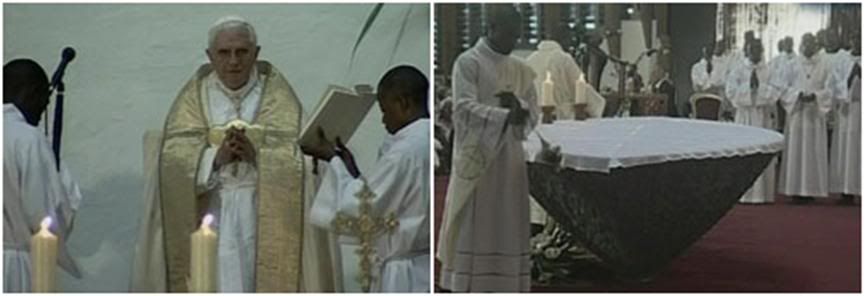
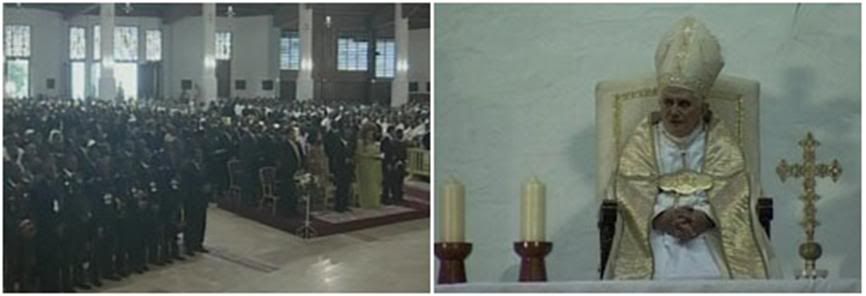
THE POPE'S ADDRESS
Dear Brother Cardinals and Bishops,
Priests and Deacons,
Consecrated Brothers and Sisters,
Friends from other Christian Confessions,
Dear Brothers and Sisters!
It is a great joy to meet here to give thanks to God in this Basilica of Marie Reine des Apôtres in Mvolyé, raised on the site of the first church built by the Missionaries of the Holy Spirit who came to bring the Good News to Cameroon.
Reflecting the apostolic fervour of those men whose hearts embraced the whole of your country, this place symbolically contains every portion of your land. And so, dear brothers and sisters, in deep spiritual closeness to all the Christian communities where you render service, we raise our prayer of praise this evening to the Father of lights.
In the presence of the representatives of other Christian confessions, to whom I extend my respectful and fraternal greetings, I wish to reflect on the figure of Saint Joseph, setting out from the words of Scripture offered to us in this evening’s liturgy.
Speaking to the crowd and to his disciples, Jesus declared: “You have only one Father” (Mt 23:9). There is but one fatherhood, that of God the Father, the one Creator of the world, “of all that is seen and unseen”. Yet man, created in the image of God, has been granted a share in this one paternity of God (cf. Eph 3:15).
Saint Joseph is a striking case of this, since he is a father, without fatherhood according to the flesh. He is not the biological father of Jesus, whose Father is God alone, and yet he lives his fatherhood fully and completely.
To be a father means above all to be at the service of life and growth. Saint Joseph, in this sense, gave proof of great devotion. For the sake of Christ he experienced persecution, exile and the poverty which this entails. He had to settle far from his native town.
His only reward was to be with Christ. His readiness to do all these things illustrates the words of Saint Paul: “It is Christ the Lord whom you serve” (Col 3:24).
What is important is not to be a useless servant, but rather a “faithful and wise servant”. The pairing of the two adjectives is not by chance. It suggests that understanding without fidelity, and fidelity without wisdom, are insufficient. One quality alone, without the other, would not enable us to assume fully the responsibility which God entrusts to us.
Dear brother priests, you are called to live out this fatherhood in the daily tasks of your ministry. In the words of the conciliar Constitution Lumen Gentium: “As their fathers in Christ, priests should care for the faithful whom they have spiritually begotten by Baptism and instruction” (No. 28).
If this is the case, how can we not continually return to the very foundation of our priesthood, the Lord Jesus Christ? Our personal relationship with Jesus is constitutive of the way we wish to live our lives. He has called us his friends because everything which he learned from the Father he has made known to us (cf. Jn 15:15).
In living out this deep friendship with Christ you will discover true freedom and deep joy. The ministerial priesthood entails a profound relationship with Christ who is given to us in the Eucharist.
Let the celebration of the Eucharist be truly the centre of your priestly lives; in this way it will also be the centre of your ecclesial mission. Throughout our lives Christ calls us to share in his mission, to be his witnesses, so that his word may be proclaimed to all.
In celebrating this sacrament in the Lord’s name and in his person, the person of the priest cannot occupy centre stage; he is a servant, a humble instrument pointing to Christ, who offers himself in sacrifice for the salvation of the world. As Jesus teaches us, “the leader must become as one who serves” (Lk 22:26).
Origen writes that “Joseph understood that Jesus was superior to him even as he submitted to him, and, knowing the superiority of his charge, he commanded him with respect and moderation. Everyone should reflect on this: frequently a lesser man is placed over people who are greater, and it happens at times that an inferior is more worthy than the one who appears to be set above him. If a person of greater dignity understands this, then he will not be puffed up with pride because of his higher rank; he will know that his inferior may well be superior to him, even as Jesus was subject to Joseph” (Homily on Saint Luke XX, 5; S.C. p. 287).
Dear brothers in the priesthood, your pastoral ministry demands many sacrifices, yet it is also a source of great joy. Trusting in your Bishops, united fraternally to the whole presbyterate and supported by the portion of the People of God commended to your care, you will be able to respond faithfully to the Lord who has called you, just as he called Joseph to watch over Mary and the Child Jesus!
May you always remain faithful, dear priests, to the promises that you made to God before your Bishop and in the presence of the whole community.
The Successor of Peter thanks you for your generous devotion to the service of the Church, and he urges you not to be troubled by the difficulties you encounter along the way. To the young men who are preparing to join you, and to those still discerning a priestly vocation, I hold out once more the joy that comes from giving oneself completely to the service of God and the Church. Be courageous, then, and generously say “yes” to Christ!
Dear brothers and sisters who live out your commitment in the consecrated life or in ecclesial movements, I also encourage you to look to Saint Joseph. When Mary received the visit of the angel at the Annunciation, she was already betrothed to Joseph.
In addressing Mary personally, the Lord already closely associates Joseph to the mystery of the Incarnation. Joseph agreed to be part of the great events which God was beginning to bring about in the womb of his spouse. He took Mary into his home. He welcomed the mystery that was in Mary and the mystery that was Mary herself.
He loved her with great respect, which is the mark of all authentic love. Joseph teaches us that it is possible to love without possessing. In contemplating Joseph, all men and women can, by God’s grace, come to experience healing from their emotional wounds, if only they embrace the plan that God has begun to bring about in those close to him, just as Joseph entered into the work of redemption through Mary and as a result of what God had already done in her.
Dear brothers and sisters from the ecclesial movements, may you be attentive to those around you, and may you reveal the loving face of God to the poor, especially by your works of mercy, your human and Christian education of young people, your programmes for the advancement of women, and in so many other ways!
The spiritual contribution offered by consecrated persons is likewise significant and indispensable for the life of the Church. This call to follow Christ is a gift for the whole People of God. According to your vocation, that of imitating Christ, chaste, poor and obedient, totally consecrated to the glory of his Father and the love of his brothers and sisters, you have the mission of bearing much-needed witness before our world to the primacy of God and of eternal life (cf. Vita Consecrata, 85).
By your unreserved fidelity to your commitments, you are for the Church a sapling of life, springing up to serve the coming of God’s Kingdom. At all times, and especially whenever your fidelity is put to the test, Saint Joseph reminds you of the value and meaning of your promises.
The consecrated life is a radical imitation of Christ. Hence the way you live ought to show clearly what inspires you, and your actions must not conceal your deepest identity. Do not be afraid of living to the full the self-offering that you have made to God, bearing authentic witness to it wherever you find yourselves.
One particular example that can encourage you to strive for holiness of life is that of Father Simon Mpeke, known as Baba Simon. All of you know how this “barefooted missionary” spent all his energies with selfless humility in the loving service of souls, heedless of the cares and sufferings involved in the material service of others.
Dear brothers and sisters, our meditation on the human and spiritual journey of Saint Joseph invites us to ponder his vocation in all its richness, and to see him as a constant model for all those who have devoted their lives to Christ in the priesthood, in the consecrated life or in the different forms of lay engagement.
Joseph was caught up at every moment by the mystery of the Incarnation. Not only physically, but in his heart as well, Joseph reveals to us the secret of a humanity which dwells in the presence of mystery and is open to that mystery at every moment of everyday life.
In Joseph, faith is not separated from action. His faith had a decisive effect on his actions. Paradoxically, it was by acting, by carrying out his responsibilities, that he stepped aside and left God free to act, placing no obstacles in his way.
Joseph is a “just man” (Mt 1:19) because his existence is “ad-justed” to the word of God. The life of Saint Joseph, lived in obedience to God’s word, is an eloquent sign for all the disciples of Jesus who seek the unity of the Church.
His example helps us to understand that it is only by complete submission to the will of God that we become effective workers in the service of his plan to gather together all mankind into one family, one assembly, one “ecclesia”.
Dear friends from other Christian confessions, this quest for unity among the disciples of Christ represents a great challenge for us. It leads us first of all to be converted to the Person of Christ, to let ourselves be drawn more and more to him.
In him, we are called to acknowledge one another as brothers and sisters, children of the same Father. During this year dedicated to the Apostle Paul, the great herald of Jesus Christ and the Apostle of the Nations, let us all turn towards him so as to hear and learn “the faith and truth” which are the deepest reasons for the unity of Christ’s disciples.
In conclusion, let us now turn to the spouse of Saint Joseph, the Virgin Mary, “Queen of Apostles”, for under this title she is invoked as Patroness of Cameroon. To her I commend the consecration which each of you has received, as well as your desire to respond ever more faithfully to your calling and to the mission entrusted to you. Finally, I invoke her intercession for your beautiful country. Amen.
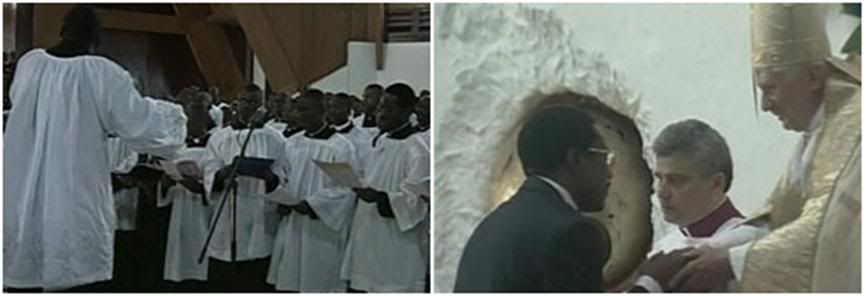
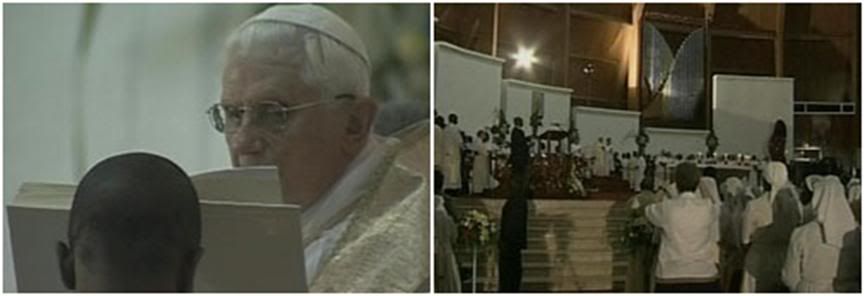 Early pictures courtesy of Vatican Radio.
About the Basilica
from the dossier of
Early pictures courtesy of Vatican Radio.
About the Basilica
from the dossier of

The Marie Reine des Apôtres Basilica is in the district of Mvolyé Hill. When the first German Pallottine missionaries arrived in Cameroon 119 years ago, they dedicated their apostolate in these mission lands to Mary, Queen of Apostles at Marienberg (8 December 1890).
Since 1901, Mvolyé Hill, in Yaoundé, was the "mother mission" for the evangelisation of the south and the southeast of the country. In the early 1980s the old church at Mvolyé was in urgent need of renovation.
In the context of celebrating the first centenary of evangelisation and in view of a considerable increase in the number of faithful who came to worship in the Marian Church, the then Archbishop of the capital, Archbishop Jean Zoa launched a project of radical renovation of the church to increase its seating capacity to 3,500, and a creation of a plaza in front of the church to accomodate anadditional 15,000-20,0000 people. The foundation stone was laid on 19 August 1990.
The Church was raised to the rank of Minor Basilica on 10 December 2006 in the presence of Benedict XVI's Papal Legate of Cardinal Jean-Louis Tauran.
The request had been made to the Holy Father in November 2005 by the Archbishop of Yaoundé, Simon-Victor Tonyé Bakot,through the then Prefect of the Congregation for Divine Worship and Discipline of the Sacraments, Cardinal Francis Arinze.
There was great joy when on 16 April 2006 the Archbishop announced during Mass that the church would be raised to the rank of Minor Basilica with the appointment of its first Rector, a position assigned a few months later to Fr Bruno Ateba.
Archbishop Zoa and the other bishops wished the renovation to be have symbolic content,and the architect Marc Nicol and engineer produced , ample open structure with the altar at the center: The roof is supported by 123 columns to represent the Twelve Apostles.
The interwoven concave forms of the exterior represent the Virgin Mary as she enfolds the Twelve Apostles in her mantle.
The construction of the complex, which includes excellent facilities for accommodating large numbers of faithful and pilgrims, was achieved with the generous help of the Catholics of the capital and other dioceses and from abroad.
[Modificato da TERESA BENEDETTA 19/03/2009 23:49] |
 18/03/2009 20:16 18/03/2009 20:16 |
|
| | | OFFLINE | | Post: 16.869 | Registrato il: 28/08/2005
| Utente Gold | |
|
 Since the main news section in the Vatican website is always at least a few hours behind the English service of Vatican Radio in posting official translations of the Holy Father's texts when he is travelling abroad, I had not checked the Press Office bulletins all morning - only to find now that Fr. Lombardi issued an official statement earlier today about the Pope's remarks on AIDS. Here is a translation:
COMMUNIQUE FROM THE PRESS OFFICE
Since the main news section in the Vatican website is always at least a few hours behind the English service of Vatican Radio in posting official translations of the Holy Father's texts when he is travelling abroad, I had not checked the Press Office bulletins all morning - only to find now that Fr. Lombardi issued an official statement earlier today about the Pope's remarks on AIDS. Here is a translation:
COMMUNIQUE FROM THE PRESS OFFICE
OF THE HOLY SEE
Translated from

Concerning the comments that have been made on some words by the Pope about the AIDS problem, the Director of the Press Office, Fr. Federico Lombardi, points out that the Holy Father simply reiterated the positions of the Catholic Church and the essential lines of her commitment in fighting the terrible scourge of AIDS:
First, through education in personal responsibility on the use of sexuality and by reaffirming the essential role of matrimony and the family;
Second, through the search and application for effective cures for AUDS and putting these at the disposition of the widest number of victims through the Church's many health institutions and initiatives;
Third, through the Church's human and spiritual assistance to AIDS victims as it extends to all who suffer, whose welfare has always been in the heart of the Church.
These are the directions in which the Church has focused its commitment, since it believes that a wider dissemination of condoms is really not the best nor the most farsighted nor the most effective way of fighting the scourge of AIDS and protecting human life.
Well, it didn't tale a prophet to know that MSM would jump on the Pope's in-flight remarks to overshadow his present mission in Africa in their coverage.
How they can make such a big deal of it as though they were hearing the Church position in AIDS and condoms for the first time is truly marvel of disingenuousness.
WHAT THE POPE SAID IN FULL
ABOUT THE CHURCH APPROACH TO AIDS
Also, the Vatican released its transcript of the Pope's inflight news conference, and I must 'change' his response to the AIDS question to agree with the Vatican transcript.
For some reason, the Corriere della Sera transcript which I translated because it was immediately available yesterday, missed certain phrases. Here is the re-translation based on the Vatican transcript. The question was asked by the reporter from France's Channel 2 TV:

3/19/09
P.S. The above introduvtion is no longer valid and is in fact erroneous. It has become clear that the Corriere della Sera transcript was correct after all - it agrees with the Pope's actual words as broadcast by Vatican Radio - therefore, the translation on the previous page is competely valid. I am marking the parts of the transcript that the Vatican altered, in the translation below.
Apparently, the Secretariat of State, which vets all translations of papal texts, deliberately changed some of the Pope's words and added a few others in a misguided and totally unnecesary effort to ... what exactly?....to edit the Pope?
It was stupid and embarrassing and entirely a disservice to the Pope, if not an insult, because the self-proclaimed vetters are presuming to tamper with the words of BENEDICT XVI, for heaven's sake, as though he were a doddering senile person who has to be 'protected against himself' as his detractors liked to say in the aftermath of Regensburg.

Among the many ills that afflict Africa there is, in particular, the widespread prevalence of AIDS. The Church's position on how to fight the disease is often considered unrealistic and ineffectual. Will you confront this issue during this trip?
I would say the opposite [about the Church position]. I think that the most efficient, the most present on the frontlines in the battle against AIDS, is the Catholic Church, with its movements and its various entities.
I think, for instance, of the Sant'Egidio Community which is doing so much, visibly and even invisibly, in the battle against AIDS, of the Camilliani, of all the nuns who are at the disposition and service of AIDS patients.
I would say that this problem with AIDS cannot be overcome with advertising slogans alone. If the spirit is not there, if the AFricans don't help each other, you cannot resolve the scourge by simply distributing condoms. On the contrary, there is a risk of increasing the problem.
[The Pope on the Vatican Radio tape, said 'soldi' (moeny), and not 'slogan pubblicitari'; and he said that condoms only 'increase the problem' not 'risk 9of )icnreasing the problem'. The doctored Vatican transcript also had the Pope using the word 'profilattici' for condoms instead of 'preservativi' which he used, and which is the more commonly used ter in Italian.]
The solution can only be found in a double effort: the first, a humanization of sexuality, that is, a human and spiritual renewal which carries with it a new way of behaving with one another; and second, a true friendship even for - and above all - for those who are suffering; the availability, despite sacrifices and personal renunciations, to be with the suffering.
These are the factors that will help and bring visible progress.
Therefore, I would stress this double effort of ours to renew man interiorly, to give spiritual and human strength for correct behavior with respect to one's own body and that of the other, along with the capacity to suffer with those who siffer, to be with them in trying situations.
I think this is the right response, which is what the Church is doing, and thus, offers a great and important contribution. Let us thank all those who do this.
 Meanwhile, Salvatore Izzo, Vaticanista for AGI (which is a secular Italian news agency), files this timely reminder of how San Francisco's gay and lesbian community picketed and railed at John Paul II when he visited that Sodom by the Pacific in far-off 1987 - all of 22 years ago - because the Church then, as it does now, opposes the use of condoms, period, consistent with Humane Vitae and the Magisterium of the Popes. But who is going to see it - or use it among AGI's MSM subscribers?
What's behind the media outrage
Meanwhile, Salvatore Izzo, Vaticanista for AGI (which is a secular Italian news agency), files this timely reminder of how San Francisco's gay and lesbian community picketed and railed at John Paul II when he visited that Sodom by the Pacific in far-off 1987 - all of 22 years ago - because the Church then, as it does now, opposes the use of condoms, period, consistent with Humane Vitae and the Magisterium of the Popes. But who is going to see it - or use it among AGI's MSM subscribers?
What's behind the media outrage
about Church policy on condoms:
AIDS is a pretext
by Salvatore Izzo

VATICAN CITY, March 18 (translated from AGI) - "The position of the Church on the use of condoms to prevent AIDS has not changed - it remains that of John Paul II," Fr. Federico Lombardi, Vatican press director, said in Yaounde today, amid a rising tide of controversy arising from the hasty reporting by the media yesterday on remarks made by the Pope en route to Yaounde yesterday.
It did not suffice that the Vatican released the full transcript of the Pope's in-flight news conference which contained no condemnation at all but was simply based on the concrete experience of Church workers who have been engaged in the fight against AIDS in Africa and in caring for AIDS victims.
The same quarrelsome words greeted John Paul II when he visited San Francisco in 1987, and even at that time, nothing could stop the polemics, not even that the Pope had kissed a baby afflicted with AIDS.
Outside the AIDS center visited by the Polish Pope, homosexual men and women dressed in 'Pope' garments gave out condoms to passersby as though they were giving out candy.
The Church, however, opposes this very thing: the distribution of condoms. even though it cannot do anything to stop it, not even in Africa.
As to confirming whether condoms are really efficient in fighting AIDS, much less to eradicate it, the issue remains open.
Catholic doctors support the Popes and say No, that instead, condoms give a false sense of security and therefore tend to favor sexual promiscuity which is the primary means of disseminating AIDS.
But the controversy really centers on the Vatican's opposition to the use of condoms per se, although the Pope;s statements yesterday had to do with their apparent ineffectiveness in preventing AIDS.
The Church has its moral doctrine on matrimony, the only condition in which sexual relations between a man and a woman are legitimate.
Distributing condoms would violate the Church catechism, whose Article 2391 says: "Carnal union is morally legitimate only when a definitive community of life between a man and woman has been established. Human love does not tolerate 'trial marriages'. It demands a total and definitive gift of persons to one another".
Moreover, in the Catechism (as in the encyclical Humanae Vitae, and the convergent Magisterium of the Popes after Paul VI), "any action is intrinsically evil which is intended as a means to prevent procreation in the fulfillment of the conjugal act".
These are really the terms protested by advocates of the use of condoms.
Some theologians, bishops and cardinals, among them, the former Archbishop of Milan, Carlo Maria Martini, have proposed that condoms should be admissible for married couples when one of them is HIV-positive in order to exercise their conjugal right.
This is the only point that divides those more liberal Catholics from the orthodox policy of the Church.
"The Church will not promote condoms" - and there can be no divergence from this position, declared Cardinal Javier Lozano Barragan recently. he is the President of the Pontifical Council for Ministry to Health care Workers, underscoring that the Church does not consider extramarital sexual relations legitimate, condom usage is not the problem. He points out that even on this, the liberal Cardinal Martini agrees.
As to the speculation about a Vatican announcement that would allow the use of condoms by married couples when one of them is HIV-positive, that now seems improbable.
Cardinal Lozano explains: "We have requested our theologians and consultants to carry out a study on this specific point. Afterwards, we will forward our conclusions to the Pope, and he will tell us what to do."
The Mexican cardinal recalled that even John Paul II was very concerned about the AIDS epidemic, but it is now up to Benedict XVI to make the definitive pronouncement on using condoms in the exceptional case cited.
 John Allen has also filed his take on the Pope's message, and has gathered some fresh 'testimonials' for and against condoms as a way to combat AIDS.
Pope's condom message
John Allen has also filed his take on the Pope's message, and has gathered some fresh 'testimonials' for and against condoms as a way to combat AIDS.
Pope's condom message
resonates with many

March 18, 2008
Yaoundè, Cameroon - Pope Benedict XVI’s claim yesterday that condoms actually aggravate the problem of AIDS may seem an explosive claim internationally, but it’s barely made a ripple here -- in part, because it simply repeats an argument made so often by Africa’s Catholic bishops that it long ago lost any shock value.
In a nutshell, the bishops’ position -- expressed both by individual prelates and by whole conferences -- is that wide availability of condoms encourages a sense of invulnerability among Africans, especially the young, that leads to riskier sexual behavior and increases the possibility of infection.
While the bishops may be nearly unanimous in that judgment, other Africans who spoke to NCR today didn’t seem quite so sure.
(One point virtually everyone here concedes is that condoms are easy to come by. In Yaoundè, a condom can be purchased from street vendors for 100 Central African Francs, roughly twenty cents. Today, it was actually easier to find condoms than water, as Yaoundè’s public water system broke down for several hours.)
While the claim that condoms promote promiscuity and thus increase the risk of disease may fly in the face of most sentiment among anti-AIDS activists, African bishops insist that it reflects their real-world experience.
“Condoms tend to give a sense of freedom to be sexually reckless, and obviously that is a major cause of the spread of HIV/AIDS,” said Archbishop John Onaiyekan of Abuja, Nigeria, who is in Cameroon for the papal visit.
“The Catholic church is not the only one saying this,” Onaiyekan said. “NGOs who want to promote condoms in my country run into resistance from many other organizations and movements, including the Muslim community as a whole.”
Bishop George Nkuo of the Kumbo diocese in Cameroon made a similar argument.
“I live in an area hit hard by the disease,” Nkubo said. “I have huge amounts of testimony that the display and the spread of condoms has only promoted promiscuity. … People believe that using them makes everything safe.”
Onaiyekan also argued that the condoms that are actually distributed in Africa, especially rural areas, are often unreliable.
“ A condom in New York is not the same thing as a condom twenty kilometers inside the bush,” he said. “Some of them sat in a container in a port, under the sun, for maybe two or three months. By the time they bring them out on bicycles, passing them out in the bush, many are no good, but what people hear is: ‘Put this on, and you’re safe.’ ”
In contrast, prelates such as Onaiyekan and Nkuo argue, promoting more responsible sexual behavior is the most effective anti-AIDS strategy.
“The whole idea that fidelity and abstinence doesn’t work is not based on concrete evidence,” Onaiyekan said. “I thought scientific people were supposed to look at the evidence. If you do that, you find that young people can actually change their mentality.”
African prelates often point to the experience of nations such as Uganda, where abstinence has been a cornerstone of anti-AIDS efforts. Among other things, they cite a Harvard study last year concluding that in African nations where the infection rate has dropped, “ reduction in the number of sexual partners was probably the single most important behavioral change” responsible for the drop-off.
Roughly 22 million people in sub-Saharan Africa are infected with HIV, according to the United Nations. In 2007, three-quarters of all AIDS deaths worldwide were in Africa, as well as two-thirds of all people living with HIV.
A decidedly unscientific survey in the streets of Cameroon’s capital city Wednesday afternoon suggests that among ordinary Africans, the anti-condoms argument is playing to mixed reviews.
“It’s not true that condoms make someone more likely to have sex,” said Donald Mepep, a 20-year-old student. Mepep predicted that if condoms were somehow to disappear, “people would still have sex -- they’d be scared, but they’d do it.”
Vanessa Balla, however, a medical doctor who treats AIDS patients, said the Pope has a point.
“With condoms, people think they can do whatever they want,” she said. “It just encourages them to engage in really risky sexual behaviors. I’ve seen it myself … they take as much risk as possible.”
Balla, who said that as a physician “it’s incredibly hard to watch young people dying of AIDS,” insisted that the solution to the crisis is “not condoms, but changing behavior.”
Julienne Christelle Bekono, also a student, said that Western donors and African governments both seem to think that if they shower a country with condoms, they’ve solved the problem of AIDS, she said. Instead, Bekono called for greater investments in finding a long-term cure -- although she said that condoms should remain part of an across-the-board approach.
Mve Louis Etong, a 52-year-old teacher of linguistics at the University of Yaoundè, said he agreed with the Pope that condoms aren’t the answer. He offered a logic, however, clearly distinct from that of Benedict XVI.
“You just don’t get the same pleasure from sexual intercourse [with a condom] as you do with full contact,” Etong said. “That’s why many Cameroon men won’t use them.”
Also on Wednesday, the Vatican spokesperson, Jesuit Fr. Federico Lombardi, issued a statement outlining the position of the Catholic church on fighting what he called “the terrible scourge of AIDS.” Lombardi summarized that position in three cornerstones:
- Education in the responsible use of sexuality … reaffirming the essential role of marriage and the family;
- Research and application of effective cures, getting them to the largest number possible of sick people through many initiatives and health care institutions;
- Human and spiritual assistance for AIDS sufferers, and all the sick.
The Church, Lombardi said, believes that “emphasizing the more widespread diffusion of condoms is not really the most far-reaching and effective means” for combating AIDS and defending human life.
[Modificato da TERESA BENEDETTA 22/03/2009 03:13]
|
 19/03/2009 00:04 19/03/2009 00:04 |
|
| | | OFFLINE | Post: 3.684 | Registrato il: 23/11/2005
| Utente Master | |
|
Pope asks Cameroon's pastoral workers to live in spirit of service
By John Thavis
Catholic News Service
March 18, 2009
YAOUNDE, Cameroon (CNS) -- Pope Benedict XVI paid tribute to Cameroon's small army of pastoral workers and asked them to "reveal the loving face of God to the poor" through their efforts.
The pope led an evening prayer liturgy March 18 at the Basilica of Mary Queen of the Apostles in a hillside neighborhood of Yaounde, the nation's capital. The basilica, a Marian sanctuary, marks the site of the first church built by missionaries to the African country more than a century ago.
Some 3,500 people packed the church. Most of them were priests and nuns, joined by deacons, members of church movements and representatives of other Christian communities.
The pope smiled when he walked briskly down the main aisle, delivering blessings left and right as digital cameras flashed around him. A whoop of joy rang out when his gift to the church, a gilded votive lamp in the form of five roses, was held aloft.
The pope's homily focused on the figure of St. Joseph, whose feast was to be celebrated the next day. St. Joseph, the pope said, remains a model for all pastoral workers precisely because he lived his life in service to God's will.
Although not the biological father of Jesus, St. Joseph lived fatherhood "fully and completely," the pope said.
"To be a father means above all to be at the service of life and growth. St. Joseph, in this sense, gave proof of great devotion. For the sake of Christ he experienced persecution, exile and the poverty which this entails," he said.
St. Joseph also loved Mary with great respect, appreciating the mystery that was unfolding in her, the pontiff said. He teaches people how to love without possessing, he added.
In that sense, he said, St. Joseph also inspires all pastoral workers today to be attentive to those around them and to God's plan.
"May you reveal the loving face of God to the poor, especially by your works of mercy, your human and Christian education of young people, your programs for the advancement of women and in so many other ways," the pope said.
Part of pastoral ministry is self-sacrifice, he said. He held out as an example a 20th-century Cameroonian priest, Father Simon Mpeke, known as "Baba Simon," who lived as a missionary in northern Cameroon among "Kirdi" or "unbelievers." He found much to admire in their culture as he evangelized them.
"All of you know how this 'barefooted missionary' spent all his energies with selfless humility in the loving service of souls, heedless of the cares and sufferings involved in the material service of others," the pope said.
As he left the church, the crowd broke into dance and song.
Cameroon has experienced a large increase in the numbers of priests and religious in recent decades and has one of the highest vocations rates in Africa. The country has 2,847 priests, or one for every 2,622 Catholics. By far the largest category of pastoral workers in Cameroon, however, is catechists, who number 18,700.
|
 19/03/2009 00:11 19/03/2009 00:11 |
|
| | | OFFLINE | Post: 3.685 | Registrato il: 23/11/2005
| Utente Master | |
|
Pope demands halt to sexual, financial scandals
John Allen
National Catholic Reporter
Yaoundè, Cameroon
March 18, 2009
On a day in which his focus turned largely to the inner life of the church, Pope Benedict XVI indirectly, yet unmistakably, demanded a halt to financial and sexual scandals that have recently tarnished the image of Catholicism in Africa, a continent that is otherwise perhaps the most compelling “good news” story for the church in the world in light of dramatic 20th century growth.
Speaking to the bishops of Cameroon, the pope called for greater oversight of priests and religious.
“I urge you to be especially vigilant regarding the faithfulness of priests and consecrated persons to the commitments made at their ordination or entry into religious life,” Benedict told the bishops in a meeting in Christ the King Church in Tsinga, outside the national capital of Yaoundè.
“The authenticity of their witness requires that there be no dichotomy between what they teach and the way they live each day,” the pope said.
While welcoming the bumper crop of candidates for the priesthood in Cameroon, the pope urged bishops to exercise “serious discernment” to ensure that future priests are “mature and balanced men.”
Though Benedict did not spell out the backdrop to his comments, local observers say the recent spate of scandal is well-known. In fact, the very setting of the pope’s address to the bishops offered an ironic reminder of the point.
Benedict met the bishops in a parish church rather than the main Yaoundè cathedral, because the cathedral is still undergoing renovations that were supposed to be completed well before the papal visit. Mass-goers and the local government had been asked to contribute funds so that the cathedral’s new bells would be in place to ring out when Benedict arrived. In fact, however, the bells never arrived, the work is not completed, and the former rector of the cathedral was recently replaced amid speculation about missing funds.
The cathedral is not an isolated case. In September 2007, the bishop of the Buea diocese suspended a popular priest, Fr. James Ekwede, amid charges of embezzling church funds. Bishop Immanuel Bushu read the letter of suspension during Mass in his cathedral, ordering Ekwede to vacate his rectory and seek refuge “anywhere he likes.” Similarly last January, Bishop George Nkuo of the Kumbo diocese had to step in after a spat erupted in a local parish, which had led to the pastor placing the entire parish community under interdict, refusing to say Mass or celebrate the other sacraments. In the background were accusations of embezzlement, and the peace deal negotiated by Nkuo involved an agreement that some $500,000 in parish money would be independently audited.
In a nation where corruption and mismanagement of resources is widely regarded as pervasive, it’s perhaps not terribly surprising that there are echoes of it also within the church. Nevertheless, the cases have given the church a black eye.
The church has also been hit by a number of sexual scandals, most involving reports of priests involved in either causal or long-term relationships with women, and, in some cases, having fathered children.
Cameroonian human rights activist Emanuel Neba Fuh published a blistering commentary on these cases in a national newspaper in early March, asking: “What lessons can an already morally impoverished society learn from a bishop or priest who fathers children haphazardly in his community? Or who sponsors a girlfriend’s trip abroad so she can bear him kids, and when he takes his vacation or study leave, he is welcomed abroad by his wife and children? … Or from priests who have become predators to vulnerable children, or who indulge in homosexual acts?”
In an evening vespers service, Benedict XVI returned to the theme. Speaking directly to priests and religious, he insisted that “the way you live ought to show clearly what inspires you, and your actions must not conceal your deepest identity.”
In other comments to the bishops, Benedict praised the contributions of priests and religious, as well as lay catechists and movements, for pursuing “authentic inculturation of the faith,” meaning a distinctively African expression of Catholic identity. He also called upon the bishops to prioritize the liturgy and the family.
Facing the challenge of what Benedict called “sects and esoteric movements,” “the growing influence of superstitious forms of religion,” as well as “secularism,” he urged the bishops to concentrate on formation of children and young adults.
The pope asked Catholic movements, including women’s associations, to be active in promoting “the dignity of women and their particular vocation in the ecclesial community and in society.”
Meanwhile, echoes from the pope’s call yesterday for Christians to speak out against “corruption and abuses of power,” continue to be heard.
Cameroon’s official government-controlled newspaper suggested in an editorial this morning that if Benedict had listened carefully to an address by President Paul Biya during the welcoming ceremony, his concerns would already have been allayed. Most local observers took the piece as a sign that the coterie around Biya feels that the narrative it wanted to present of the trip -- of what massive billboards around town refer to as “perfect communion” between the pope and the president -- is slipping away.
While the 76-year-old Biya gets credit for keeping the peace in a tough neighborhood (Cameroon borders both Chad and Congo-Brazzaville), his regime is also seen as undemocratic, relying on intimidation and corruption, and has frequently been targeted by international human rights and pro-democracy groups.
Perhaps emboldened by the pope’s call, Catholic leaders seem to be seizing the initiative.
In an interview with French radio, Cardinal Christian Tumi publicly called for President Paul Biya, who has ruled Cameroon since 1982, not to extend his grip on power in what are widely viewed as faux elections set for 2011. Observers say it’s unusual for a national figure, especially a religious leader, to publicly suggest that it’s time for Biya to step aside. (Political opposition of any sort has only been legally tolerated since 1992.)
Tomorrow morning, Benedict XVI will meet a delegation of local Muslims before celebrating a public Mass in a downtown sports stadium. In the afternoon, he’ll visit a local Catholic center that cares for sick and suffering people, especially children.
On Friday, Benedict moves on to Angola for the second leg of his March 17-23 Africa journey.
|
 19/03/2009 01:51 19/03/2009 01:51 |
|
| | | OFFLINE | | Post: 16.871 | Registrato il: 28/08/2005
| Utente Gold | |
|
 Andrea Tornielli gave us a sampling on his blog yesterday, but Avvenire's reporter makes Yaounde's welcome for the Pope the news itself - but the kind of news that the MSM reporters hardly ever think of as news - especially not if it goes against their cast-in-steel preconception of Benedict XVI.
Peter and the world:
Andrea Tornielli gave us a sampling on his blog yesterday, but Avvenire's reporter makes Yaounde's welcome for the Pope the news itself - but the kind of news that the MSM reporters hardly ever think of as news - especially not if it goes against their cast-in-steel preconception of Benedict XVI.
Peter and the world:
Yaounde's welcome
for Benedict XVI
by MIMMO MUOLO
Translated from

It seemed as if they were all there to wait for him - all 1,700,000 residents or whatever population the capital city of Cameroon holds - when Alitalia's Boeing 777 with the Pope and his delegation touched down promptly at 4 p.m. on a sunny, very warm and humid African afternoon.
The international airport is 30 kilometers away from the city - and the Yaoundians were all there, under the burning sun, to await the Popemobile.
An uniterrupted human hedge on both sides of the highway, with hundreds of thousands of children, young people and adults, festiely waving their arms or their caps, many dancing to the rhythm of drums, or sawying gracefully and naturally, in their vivid garments matching the rich red soil of the roads and alleys of this fairly large metropolis in the heart of the Dark Continent.
In the Popemobile, Benedict XVI - who, on the flight, had just been telling newsmen how he loves the joyous faith ot the African people, adn who, in his official speech at the airport, praised Cameroon as a land of life, of peace, and of youth - never stopped waving and smiling back, returning all that exuberant welcome, during the hourlong motorcade into the city.
His eyes beamed with happiness for this first encounter with Africans that could not have been more joyous - seeming to confirm what the Pope himself had said earlier in his arrival speech.
It was no ritual speech. In it, Benedict XVI framed outright the true problems of the continent.
For instance, he points out - for the benefit of those who condition their aid on the adoption of demographic policies to include abortion and other artificial means of birth control - that Africa cannot be helped or saved by "the imposition of cultural models that ignore the right to life of the unborn."
The African peoples, he said, "cry out for reconciliation, justice and peace, and it is precisely this that the Church offers them".
"Not new forms of political or economic repression," he adds, "but the glorious freedom of the children of God. Not bitter inter-ethnic or inter-religious rivalries, but the rightness, the peace and the joy of the Kingdom of God."
Nor did he fail to deplore the plague represented by 'modern forms of slavery', often linked to clandestine immigration. Doing so in the continent from which, for centuries, slaves were shipped to the Americas. So he condemned 'the traffic in human beings, especially of helpless women and children'.
In a time of "global scarcity of food, of financial chaos, of disturbing patterns of climate change, Africa suffers disproportionately: a growing number of its inhabitants end up being prey to hunger, to poverty, to disease," he said.
But Benedict XVI also brings a message of hope. He said so on the airplane, speaking to newsmen. He repeated it in front of President Paul Biya, who welcomed him formally under a gazebo that had been set up on the airfield: "Cameroon is effectively the land of hope for many in central Africa."
The Pope's first speech gave content to a welcome ceremony that was a bit too standard, with Benedict XVI led by his host around the perimeter of the landing area to greet all the local dignitaries lines up along the red carpet, along with the prelates of Cameroon led by the president of their bishops' conference, Mons. Simon-Victor Tonyé Bakot.
Tomorrow, the Pope will consign to the bishops of Africa the Instrumentum laboris for the Bishops' Synod's special assembly for Africa that is the background for the African visit.
With the hope that from this 'Africa in miniature' that Cameroon represents with its 240 ethic tribes, the desired peace, justice and reconciliation may spread towards all of Africa.
[Modificato da TERESA BENEDETTA 22/03/2009 03:15] |
 19/03/2009 02:35 19/03/2009 02:35 |
|
| | | OFFLINE | | Post: 16.872 | Registrato il: 28/08/2005
| Utente Gold | |
|
 This is an item I first came across last Sunday but was unable to post promptly. Missionline is the complementary online outlet of the monthly magazine Mondo e Missione, published by the Pontifical Institute for Foreign Missions (known as PIME from its Italian acronym), which is also the mother organization for AsiaNews.
Pope Benedict asks Indian archbishop
This is an item I first came across last Sunday but was unable to post promptly. Missionline is the complementary online outlet of the monthly magazine Mondo e Missione, published by the Pontifical Institute for Foreign Missions (known as PIME from its Italian acronym), which is also the mother organization for AsiaNews.
Pope Benedict asks Indian archbishop
to write the meditations
for this year's Via Crucis
by Lorenzo Fazzini

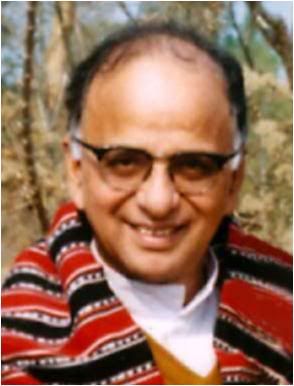
Benedict XVI has chosen Indian Archbishop Thomas Menamparampil of Guwahati to write the meditations and prayers for the Way of the Cross which will take place in the Roman Colosseum on Good Friday.
A Vatican source confirmed this to the Indian news agency SarNews on Sunday, March 16. Last year, the Pope asked Cardinal Joseph Zen of Hong Kong to prepare the annual meditations, which Benedict himself, as Cardinal Ratzinger, had prepared in 2005, shortly before he was elected Pope.
«For the second year in a row, the Pope, in solidarity with suffering Christians, has called on Church leaders from the persecuted Churches to prepare the meditations and prayers to be used at the Good Friday devotion which the Pope will personally preside at," the Vatican source said.
Thomas Menamparampil, 72, a Salesian [like Cardinal Zen], leads a diocese in the northeastern Indian state of Assam, troubled by communal violences between the tribal Bodos and the local Muslims.
He is personally engaged in reconciliation initiatives. He has also spoken out about the violences of the Hindu fundamentalists towards the Christians in Orissa, which has resulted in 130 deaths and 50.000 refugees.
Bishop Menamparampil was one of the five key speakers representing the five continents, during the last Synod of Bishops in Rome. He presented "The Word of God in Asia", a comprehensive analysis of the situation of the Church in the biggest world continent.
[Modificato da TERESA BENEDETTA 28/03/2009 23:03] |
 19/03/2009 04:38 19/03/2009 04:38 |
|
| | | OFFLINE | | Post: 16.873 | Registrato il: 28/08/2005
| Utente Gold | |
|
 Blessed are they
Blessed are they
who are not scandalized
by the Pope's words
on condoms and AIDS
by José Luis Restán
Translated from

March 18, 2009
Once again, the Church is in th4 eye of the storm. Once again, the Pope's words have been manipulated, excerpted, reduced and converted into a call to arms of extreme ferocity - joined promptly by meek sheep like Sarkozy who gohappily wherever the mainstream media lead, and are especially intent not to deviate by a millimeter from the iron dictatorship of political correctness.
Enroute to Africa, Benedict XVI had the audacity to say that the mere distribution of condoms is not an adequate way to face the scourge of AIDS.
This was said by a man who heads a wordlwide community whose members devote themselves daily in thousands of advance posts on the front lines that are most exposed in this terrible war.
He says it with the head and the heart of someone who takes upon himself the burden of the unspeakable suffering that decimates entire populations, which leaves orphans on the streets, which plunges millions of men and omwn into despair.
A terrible scourge, he called it. He knows, because it is reported to him daily by his bishops, his volunteers, his priests and nuns who all pay a high price in this battle but do not count the costs.
And he knows because even if they beat up on him as though he were the most unsympathetic despot, he has a pastor's heart that is moved by every pain that his flock feels, even those who are geographically distant; and he has a mind that soars far higher than can possibly be dreamed of by those who attack him with implacable viciousness.
If the spirit is lacking, the Pope said on the plane, if Africans do nto help each other in the necessary work of profoundly changing the mentality about the proper uses of human sexuality, with oneself and with others, then all the money and all the advertising slogans will not help, and distributing condoms to stem the epidemic only risks increasing the problem.
Oh what a scandal! The dogma of safe sex quarantined by an old Pope.
But is it not the obvious failure of hundreds of millions spent for condoms evidence that they are not the answer to stopping the AIDS pandemic?
Is not Uganda the one nation that has shown remarkable success in fighting AIDS by basing it AIDS policy on a return to family traditions of matrimonial fidelity and familial stability?
Does not the massive distribution of condems, accompanied by frivolous slogans, contribute to create a climate that neutralizes every effort to educate people in responsible sex, every effort to create a new mentality?
In the huge global talk-show to which the world has been converted, everything is allowed, everything is accepted - everything except what the Bishop of Rome says when he speaks with reason and with heart tio contradict all teh gurus of relativism who have been engaged in dismantling piece by piece the original marvelous meaning of human sexuality.
The Pope's message is rooted in the bimillenary experience of the Church, its active presence at the victim's bedside, in his dying moments, unlike all the designers of those expensive anti-AIDS campaigns who work out of their upscale offices far removed from the tragedy.
Sexuality has to be humanized, said the Pope, who is attentive to every aspect of the current crisis of culture. In the disarticulation of human sexuality, in its degradation by the counterculture ideology of 1968, it seems as if the Church is the only institution left which has the courage to denounce such deumanization, and what may seem more surprising, with the human wisdom to reconstruct it in its full significance.
And so, there is need for that cultural and spiritual change ignored in the campaigns of the great advertising agencies and by mass media as a whole,
There is need for that love-charity for the afflicted, those who are dying, for orphans and widows. That which has formed through the centiuries a culture of caring for the sick that has unequivocal Christian roots.
Africa knows a lot about such love, and that is why it has welcomed the Pope with joyful faith, deaf to the rabcor-laden polemics surging from the West like a furious tide.
In Africa, one can still see that the faith as lived also carries invincible hope, as the Pope - and Christian doctrine - teaches.
[Modificato da TERESA BENEDETTA 19/03/2009 04:45] |
 19/03/2009 12:50 19/03/2009 12:50 |
|
| | | OFFLINE | | Post: 16.875 | Registrato il: 28/08/2005
| Utente Gold | |
|
 It's anniversary day today:
It's anniversary day today:

47 months ago, Benedict XVI became Pope.
ALL OUR LOVE AND PRAYERS, HOLY FATHER.
AND WE WISH YOU A BLESSED NAME DAY TODAY.
AD MULTOS ANNOS!
March 19
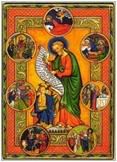 St. Joseph, Spouse of Mary
St. Joseph, Spouse of Mary
Patron of the Universal Church
OR today.
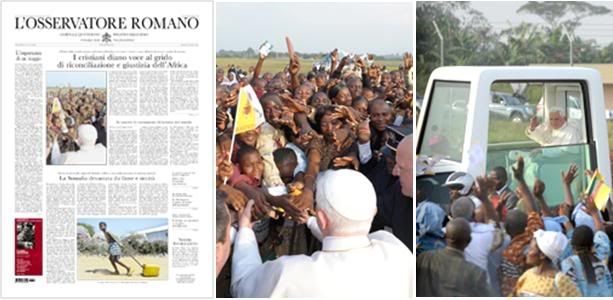
On his second day in Cameroon, Benedict XVI calls on bishops
to be defenders of the poor and men of hope:
'Let Christians give voice to Africa's cry for reconciliation and justice'
Other Page 1 stories: An editorial on the significance of the Pope's trip to Africa; a wrap-up story on the trip
so far; and Somalia devastated by hunger and drought. The inside pages contains a transcript of the Pope's
inflight news conference on Tuesday.
THE POPE'S DAY
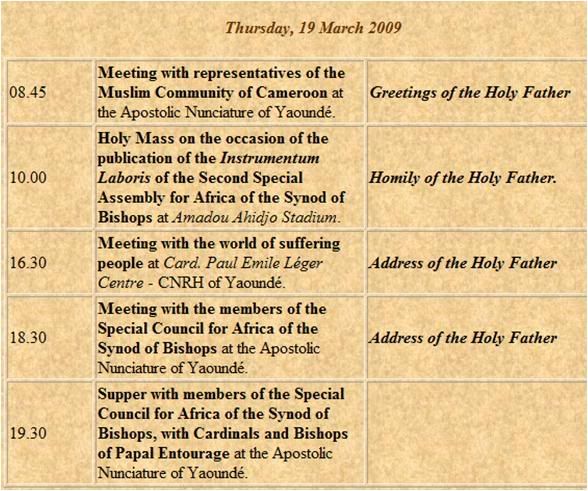
[Modificato da TERESA BENEDETTA 19/03/2009 23:40] |
 19/03/2009 13:32 19/03/2009 13:32 |
|
| | | OFFLINE | | Post: 16.876 | Registrato il: 28/08/2005
| Utente Gold | |
|
 DAY 3 - MEETING WITH MUSLIMS
DAY 3 - MEETING WITH MUSLIMS
They tell the Pope:
'You are not alone'
Translated from
 online
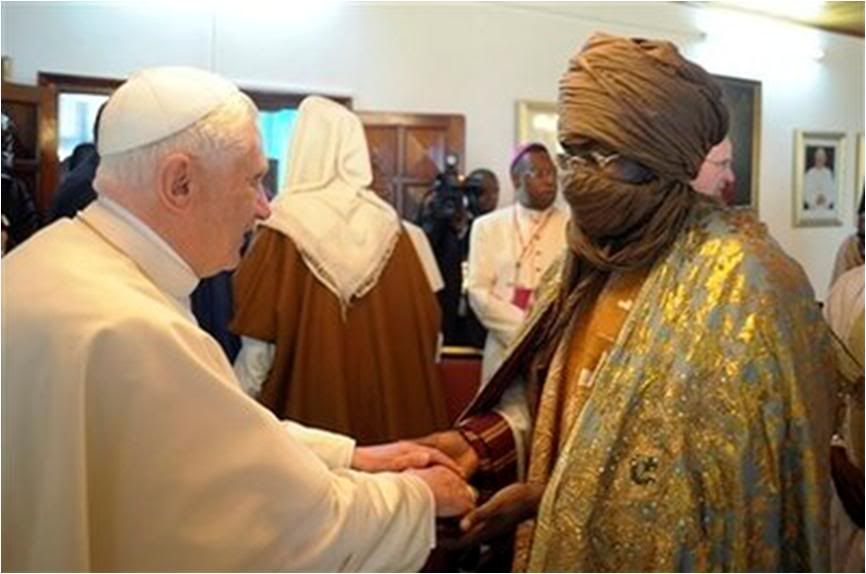
Pope Benedict XVI met this morning with representatives of Cameroon Muslims at the Apostolic Nunciature.
Fr. Feederico Lombardi, Vatican press director, said they expressed 'affection' for the Holy Father, telling him, "You are not alone".
The Pope spoke to them of the importance of "genuine religion that rejects all forms of violence and totalitarianism."
In Cameroon, Islam represents about 22% of the population of 17 million, and has good relations with other religions, including Catholics who make up 27% of the populatuion.
Benedict XVI praised this example of living together in peace, underscroing that Christians and Muslims in Cameroon "offer testmony of the fundamental values on family, social responsibility, obedience to the law of God, and of caring for the sick and the suffering."
Here is the Vatican translation of the Pope's address to the Muslims. It is unusually beautiful - perhaps the most beautiful he has ever addressed to a Muslim group:
ADDRESS TO THE MUSLIMS
OF CAMEROON
My Dear Friends,
Grateful for this opportunity to meet representatives of the Muslim community in Cameroon, I express my heartfelt thanks to Mr Amadou Bello for his kind words of greeting extended to me on your behalf.
Our encounter is a vivid sign of the desire we share with all people of good will – in Cameroon, throughout Africa and across the globe – to seek opportunities to exchange ideas about how religion makes an essential contribution to our understanding of culture and the world, and to the peaceful coexistence of all the members of the human family.
Initiatives in Cameroon, such as the Association Camerounaise pour le Dialogue Interreligieux, illustrate how such dialogue enhances mutual understanding and assists in the building up of a stable and just political order.
Cameroon is home to thousands of Christians and Muslims, who often live, work and worship in the same neighbourhood. Both believe in one, merciful God who on the last day will judge mankind (cf. Lumen Gentium, 16).
Together they bear witness to the fundamental values of family, social responsibility, obedience to God’s law and loving concern for the sick and suffering.
By patterning their lives on these virtues and teaching them to the young, Christians and Muslims not only show how they foster the full development of the human person, but also how they forge bonds of solidarity with one’s neighbours and advance the common good.
My friends, I believe a particularly urgent task of religion today is to unveil the vast potential of human reason, which is itself God’s gift and which is elevated by revelation and faith.
Belief in the one God, far from stunting our capacity to understand ourselves and the world, broadens it. Far from setting us against the world, it commits us to it.
We are called to help others see the subtle traces and mysterious presence of God in the world which he has marvellously created and continually sustains with his ineffable and all-embracing love.
Although his infinite glory can never be directly grasped by our finite minds in this life, we nonetheless catch glimpses of it in the beauty that surrounds us.
When men and women allow the magnificent order of the world and the splendour of human dignity to illumine their minds, they discover that what is “reasonable” extends far beyond what mathematics can calculate, logic can deduce and scientific experimentation can demonstrate; it includes the goodness and innate attractiveness of upright and ethical living made known to us in the very language of creation.
This insight prompts us to seek all that is right and just, to step outside the restricted sphere of our own self-interest and act for the good of others.
Genuine religion thus widens the horizon of human understanding and stands at the base of any authentically human culture. It rejects all forms of violence and totalitarianism: not only on principles of faith, but also of right reason.
Indeed, religion and reason mutually reinforce one another since religion is purified and structured by reason, and reason’s full potential is unleashed by revelation and faith.
I therefore encourage you, my dear Muslim friends, to imbue society with the values that emerge from this perspective and elevate human culture, as we work together to build a civilization of love.
May the enthusiastic cooperation of Muslims, Catholics and other Christians in Cameroon be a beacon to other African nations of the enormous potential of an interreligious commitment to peace, justice and the common good!
With these sentiments, I once again express my gratitude for this auspicious occasion to meet you during my visit to Cameroon. I thank Almighty God for the blessings he has bestowed upon you and your fellow citizens, and I pray that the links that bind Christians and Muslims in their profound reverence for the one God will continue to grow stronger, so that they will reflect more clearly the wisdom of the Almighty, who enlightens the hearts of all mankind.
On Islam in Cameroon
From the dossier of

Whereas in Angola followers of Islam are a small minority (80,000 to 90,000), in Cameroon, Muslims represent a large part of the population (almost 4 million, equal to 22%).
Almost five years ago there was alarm in Angola due to a rumour that Islamic extremist militants from other countries of Africa were beginning to infiltrate in some parts of Angola connected with the illegal exploitation of diamonds. Later,vaccording to government sources, the alarm ceased.
In Cameroon instead, the Muslim presence is consolidated although here, unlike other countries, it is tolerant, moderate and far from any extremism, terrorism or fundamentalism.
One remarkable fact is the organisation of Muslim faithful in Cameroon, who are directed by 14 principal Imams31, including famous Ibrahim Moussa, Grand Imam of Yaoundé, who in August 2008 took charge of the Grande Mosquée Central in the capital, the “Centre du serviteur des deux saintes mosquées”, with Cameroon's most important School of Koran.
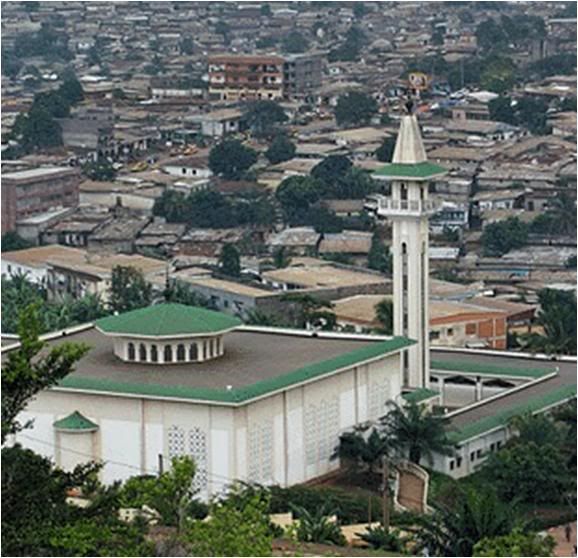
Islam spread in the country in the early 19th century, especially through Fula nomad herdsmen and the Sufi Confraternity (Qadiri and Tijani). They came from east Africa to improve their commercial activities.
A first wave entered the country from the north and this explains why the north has the largest average of Muslims in the country. Later Islam spread to the centre of Cameroon.
John Paul II said in Yaoundé, on 12 August 1985 during a meeting with Muslim representatives, that Catholics and Muslims have always lived peacefully side by side. He referred to Cameroon's "pluralist society where Christians, Muslims and followers of African traditional religions live side by side"
"Christians and Muslims," he said, "must resist the sort of temptations which cannot lead humanity to perform “the good actions, in keeping with the life which God planned for us in the beginning ”. For us, the real path is that of dialogue, which has various aspects. [Modificato da TERESA BENEDETTA 19/03/2009 23:58] |
 19/03/2009 14:31 19/03/2009 14:31 |
|
| | | OFFLINE | | Post: 16.877 | Registrato il: 28/08/2005
| Utente Gold | |
|
 DAY 3 - MASS AT AHMADOU AHIDJO STADIUM
DAY 3 - MASS AT AHMADOU AHIDJO STADIUM
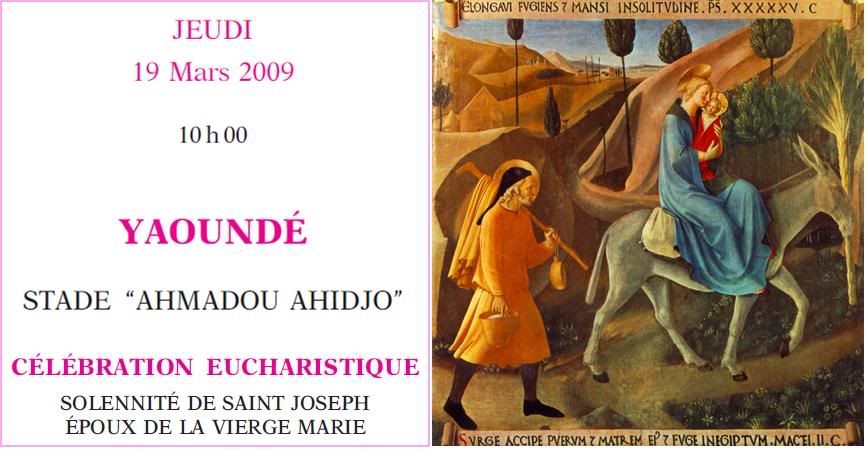 Illustration: 'Flight to Egypt', Fra Angelico, c. 1460. Tempera on wood, 39x37, Museo di San Marco, Florence.
Just a tiny sampling of the wonderful pictures from the Mass today:
Illustration: 'Flight to Egypt', Fra Angelico, c. 1460. Tempera on wood, 39x37, Museo di San Marco, Florence.
Just a tiny sampling of the wonderful pictures from the Mass today:
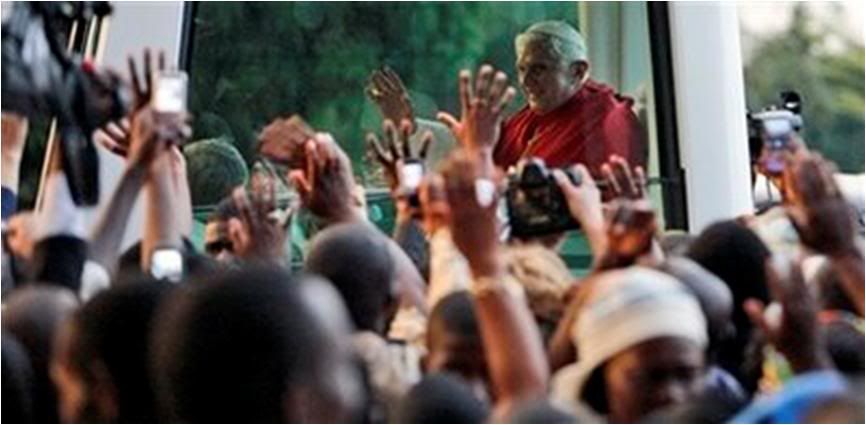
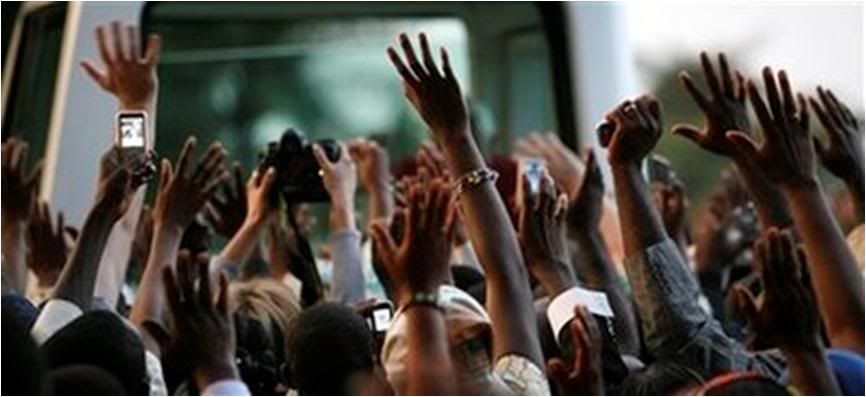
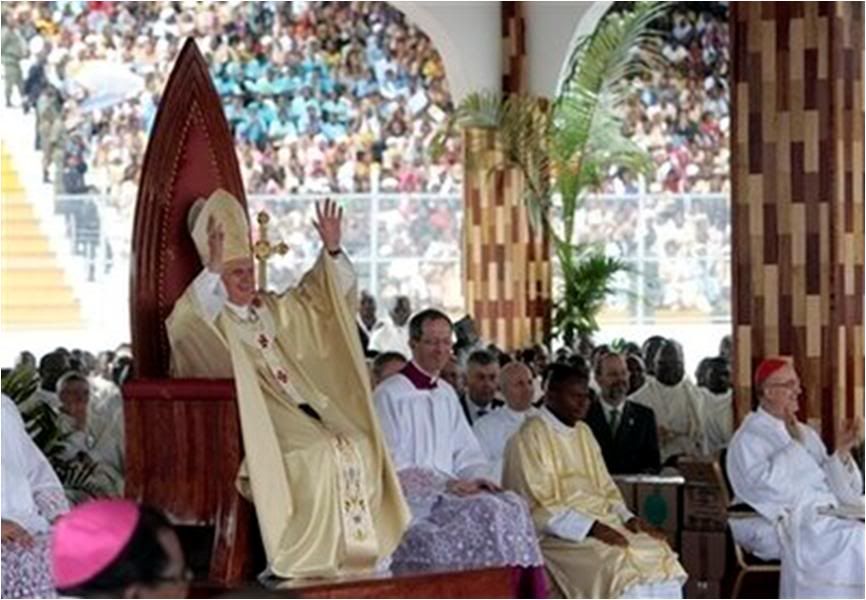
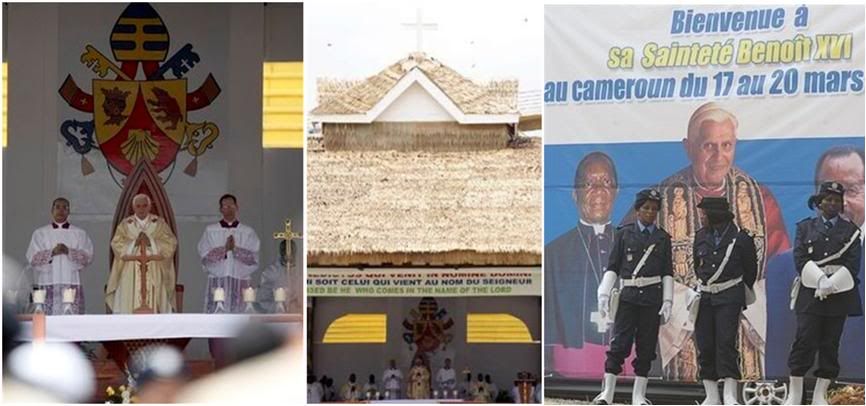
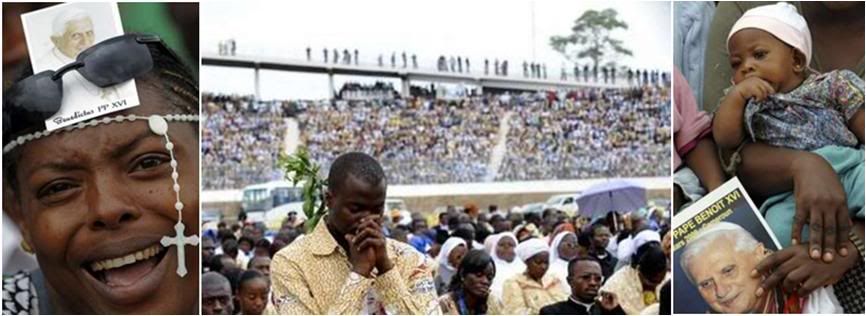
HOMILY OF THE HOLY FATHER
Mass on the Solemnity of St. Joseph
and Publication of the Instrumentum Laboris
for the Second Special Session for Africa
of the Bishops' Synod
Dear Brother Bishops,
Dear Brothers and Sisters,
Praised be Jesus Christ who has gathered us in this stadium today that we may enter more deeply into his life!
Jesus Christ brings us together on this day when the Church, here in Cameroon and throughout the world, celebrates the Feast of Saint Joseph, Husband of the Virgin Mary.
I begin by wishing a very happy feast day to all those who, like myself, have received the grace of bearing this beautiful name, and I ask Saint Joseph to grant them his special protection in guiding them towards the Lord Jesus Christ all the days of their life. I also extend cordial best wishes to all the parishes, schools, colleges, and institutions named after Saint Joseph.
I thank Archbishop Tonyé-Bakot of Yaoundé for his kind words, and I warmly greet the representatives of the African Episcopal Conferences who have come to Yaoundé for the promulgation of the Instrumentum Laboris of the Second Special Assembly for Africa of the Synod of Bishops.
How can we enter into the specific grace of this day? In a little while, at the end of Mass, the liturgy will remind us of the focal point of our meditation when it has us pray: “Lord, today you nourish us at this altar as we celebrate the feast of Saint Joseph. Protect your Church always, and in your love watch over the gifts you have given us.”
We are asking the Lord to protect the Church always – and he does! – just as Joseph protected his family and kept watch over the child Jesus during his early years.
Our Gospel reading recalls this for us. The angel said to Joseph: “Do not be afraid to take Mary your wife into your home,” (Mt 1:20) and that is precisely what he did: “he did as the angel of the Lord had commanded him” (Mt 1:24).
Why was Saint Matthew so keen to note Joseph’s trust in the words received from the messenger of God, if not to invite us to imitate this same loving trust?
Although the first reading which we have just heard does not speak explicitly of Saint Joseph, it does teach us a good deal about him. The prophet Nathan, in obedience to God’s command, tells David: “I will raise up your heir after you, sprung from your loins” (2 Sam 7:12). David must accept that he will die before seeing the fulfilment of this promise, which will come to pass “when (his) time comes” and he will rest “with (his) ancestors”.
We thus come to realize that one of mankind’s most cherished desires – seeing the fruits of one’s labours – is not always granted by God. I think of those among you who are mothers and fathers of families. Parents quite rightly desire to give the best of themselves to their children, and they want to see them achieve success.
Yet make no mistake about what this “success” entails: what God asks David to do is to place his trust in him. David himself will not see his heir who will have a throne “firm for ever” (2 Sam 7:16), for this heir, announced under the veil of prophecy, is Jesus. David puts his trust in God.
In the same way, Joseph trusts God when he hears his messenger, the Angel, say to him: “Joseph, son of David, do not be afraid to take Mary your wife into your home. For it is through the Holy Spirit that this child has been conceived in her” (Mt 1:20).
Throughout all of history, Joseph is the man who gives God the greatest display of trust, even in the face of such astonishing news.
Dear fathers and mothers here today, do you have trust in God who has called you to be the fathers and mothers of his adopted children? Do you accept that he is counting on you to pass on to your children the human and spiritual values that you yourselves have received and which will prepare them to live with love and respect for his holy name?
At a time when so many people have no qualms about trying to impose the tyranny of materialism, with scant concern for the most deprived, you must be very careful. Africa in general, and Cameroon in particular, place themselves at risk if they do not recognize the True Author of Life!
Brothers and sisters in Cameroon and throughout Africa, you who have received from God so many human virtues, take care of your souls! Do not let yourselves be captivated by selfish illusions and false ideals!
Believe – yes! – continue to believe in God – Father, Son, and Holy Spirit – he alone truly loves you in the way you yearn to be loved, he alone can satisfy you, can bring stability to your lives. Only Christ is the way of Life.
God alone could grant Joseph the strength to trust the Angel. God alone will give you, dear married couples, the strength to raise your family as he wants. Ask it of him! God loves to be asked for what he wishes to give.
Ask him for the grace of a true and ever more faithful love patterned after his own. As the Psalm magnificently puts it: his “love is established for ever, his loyalty will stand as long as the heavens” (Ps 88:3).
Just as on other continents, the family today – in your country and across Africa – is experiencing a difficult time; but fidelity to God will help see it through.
Certain values of the traditional life have been overturned. Relationships between different generations have evolved in a way that no longer favours the transmission of accumulated knowledge and inherited wisdom.
Too often we witness a rural exodus not unlike that known in many other periods of human history. The quality of family ties is deeply affected by this.
Uprooted and fragile members of the younger generation who often – sadly – are without gainful employment, seek to cure their pain by living in ephemeral and man-made paradises which we know will never guarantee the human being a deep, abiding happiness.
Sometimes the African people too are constrained to flee from themselves and abandon everything that once made up their interior richness. Confronted with the phenomenon of rapid urbanization, they leave the land, physically and morally: not as Abraham had done in response to the Lord’s call, but as a kind of interior exile which alienates them from their very being, from their brothers and sisters, and from God himself.
Is this an irreversible, inevitable development? By no means! More than ever, we must “hope against all hope” (Rom 4:18).
Here I wish to acknowledge with appreciation and gratitude the remarkable work done by countless associations that promote the life of faith and the practice of charity. May they be warmly thanked! May they find in the word of God renewed strength to carry out their projects for the integral development of the human person in Africa, especially in Cameroon!
The first priority will consist in restoring a sense of the acceptance of life as a gift from God. According to both Sacred Scripture and the wisest traditions of your continent, the arrival of a child is always a gift, a blessing from God.
Today it is high time to place greater emphasis on this: every human being, every tiny human person, however weak, is created “in the image and likeness of God” (Gen 1:27).
Every person must live! Death must not prevail over life! Death will never have the last word!
Sons and daughters of Africa, do not be afraid to believe, to hope, and to love; do not be afraid to say that Jesus is the Way, the Truth and the Life, and that we can be saved by him alone.
Saint Paul is indeed an inspired author given to the Church by the Holy Spirit as a “teacher of nations” (1 Tim 2:7) when he tells us that Abraham, “hoping against hope, believed that he should become the father of many nations; as he had been told, ‘So shall your descendants be’” (Rom 4:18).
“Hoping against hope”: is this not a magnificent description of a Christian? Africa is called to hope through you and in you! With Jesus Christ, who trod the African soil, Africa can become the continent of hope!
We are all members of the peoples that God gave to Abraham as his descendants. Each and every one of us was thought, willed and loved by God. Each and every one of us has a role to play in the plan of God: Father, Son and Holy Spirit.
If discouragement overwhelms you, think of the faith of Joseph; if anxiety has its grip on you, think of the hope of Joseph, that descendant of Abraham who hoped against hope; if exasperation or hatred seizes you, think of the love of Joseph, who was the first man to set eyes on the human face of God in the person of the Infant conceived by the Holy Spirit in the womb of the Virgin Mary.
Let us praise and thank Christ for having drawn so close to us, and for giving us Joseph as an example and model of love for him.
Dear brothers and sisters, I want to say to you once more from the bottom of my heart: like Joseph, do not be afraid to take Mary into your home, that is to say do not be afraid to love the Church.
Mary, Mother of the Church, will teach you to follow your pastors, to love your bishops, your priests, your deacons and your catechists; to heed what they teach you and to pray for their intentions.
Husbands, look upon the love of Joseph for Mary and Jesus; those preparing for marriage, treat your future spouse as Joseph did; those of you who have given yourselves to God in celibacy, reflect upon the teaching of the Church, our Mother: “Virginity or celibacy for the sake of the Kingdom of God not only does not contradict the dignity of marriage but presupposes and confirms it. Marriage and virginity are two ways of expressing and living the one mystery of the Covenant of God with his people” (Redemptoris Custos, 20).
Once more, I wish to extend a particular word of encouragement to fathers so that they may take Saint Joseph as their model. He who kept watch over the Son of Man is able to teach them the deepest meaning of their own fatherhood. In the same way, each father receives his children from God, and they are created in God’s own image and likeness.
Saint Joseph was the spouse of Mary. In the same way, each father sees himself entrusted with the mystery of womanhood through his own wife. Dear fathers, like Saint Joseph, respect and love your spouse; and by your love and your wise presence, lead your children to God where they must be (cf. Lk 2:49).
Finally, to all the young people present, I offer words of friendship and encouragement: as you face the challenges of life, take courage! Your life is priceless in the eyes of God!
Let Christ take hold of you, agree to pledge your love to him, and – why not? – maybe even do so in the priesthood or in the consecrated life! This is the supreme service.
To the children who no longer have a father, or who live abandoned in the poverty of the streets, to those forcibly separated from their parents, to the maltreated and abused, to those constrained to join paramilitary forces that are terrorizing some countries, I would like to say: God loves you, he has not forgotten you, and Saint Joseph protects you! Invoke him with confidence.
May God bless you and watch over you! May he give you the grace to keep advancing towards him with fidelity! May he give stability to your lives so that you may reap the fruits he awaits from you! May he make you witnesses of his love here in Cameroon and to the ends of the earth! I fervently beg him to give you a taste of the joy of belonging to him, now and for ever. Amen.
[Modificato da TERESA BENEDETTA 19/03/2009 15:23] |
 19/03/2009 14:59 19/03/2009 14:59 |
|
| | | OFFLINE | | Post: 16.878 | Registrato il: 28/08/2005
| Utente Gold | |
|
|
|
|
|
|